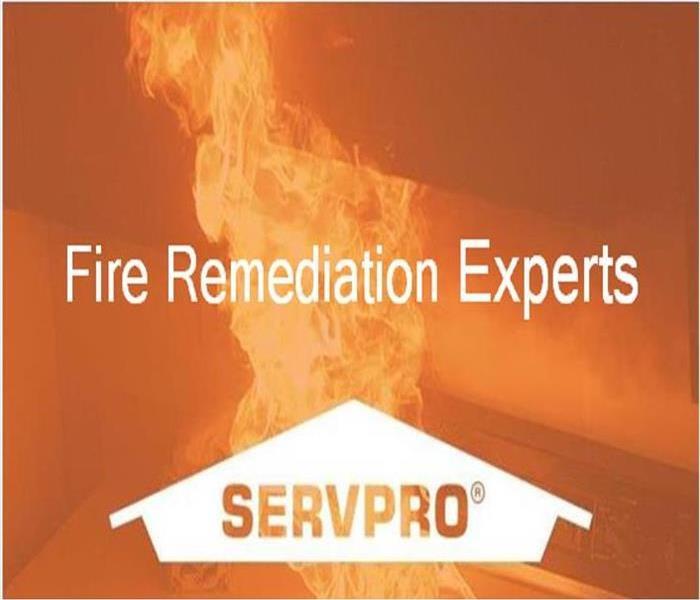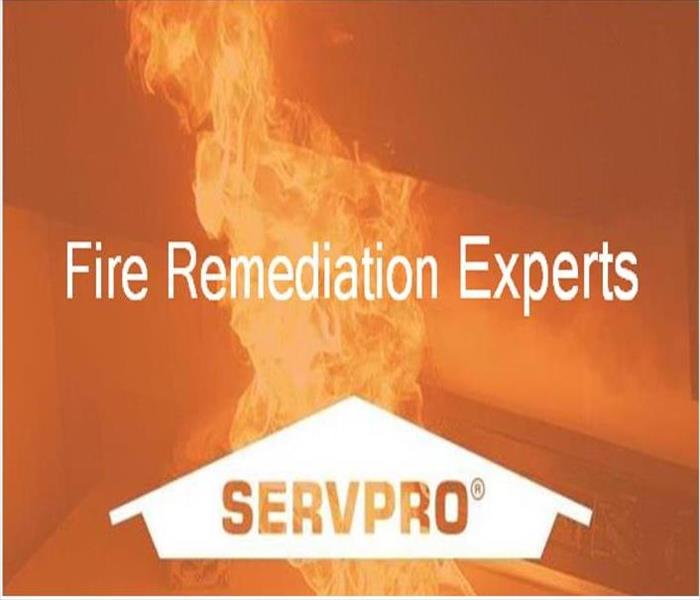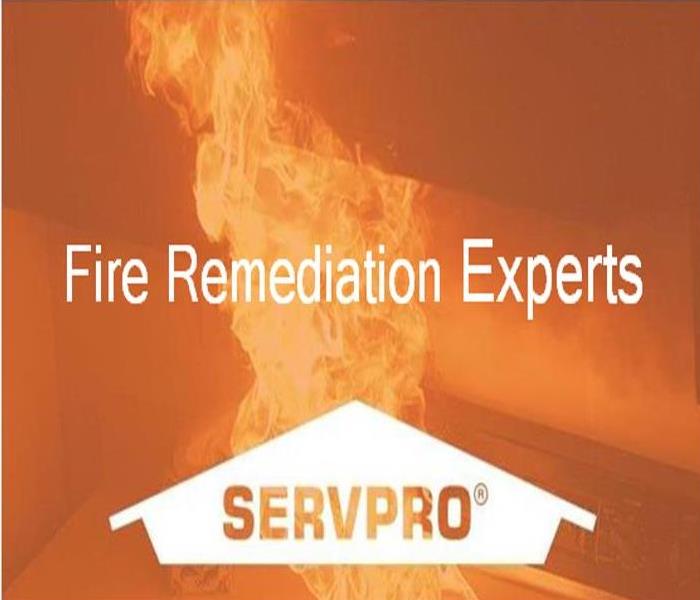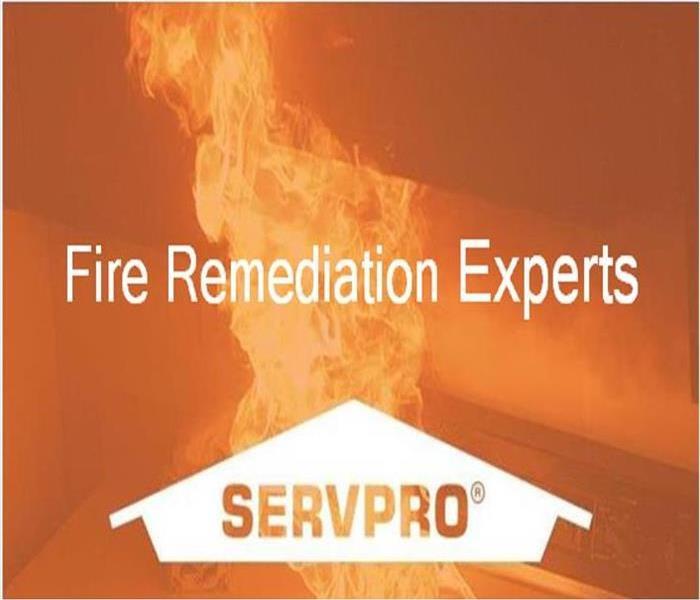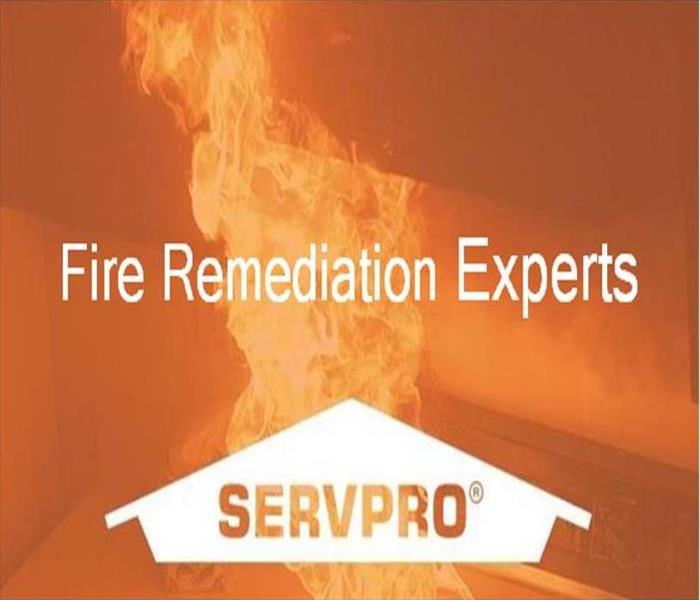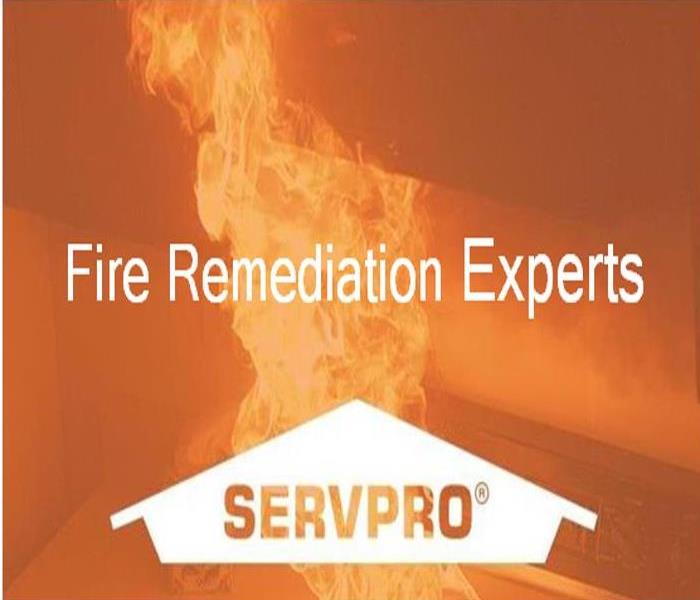Recent Fire Damage Posts
Essential Fire Prevention Tips for Homes and Businesses
2/20/2025 (Permalink)
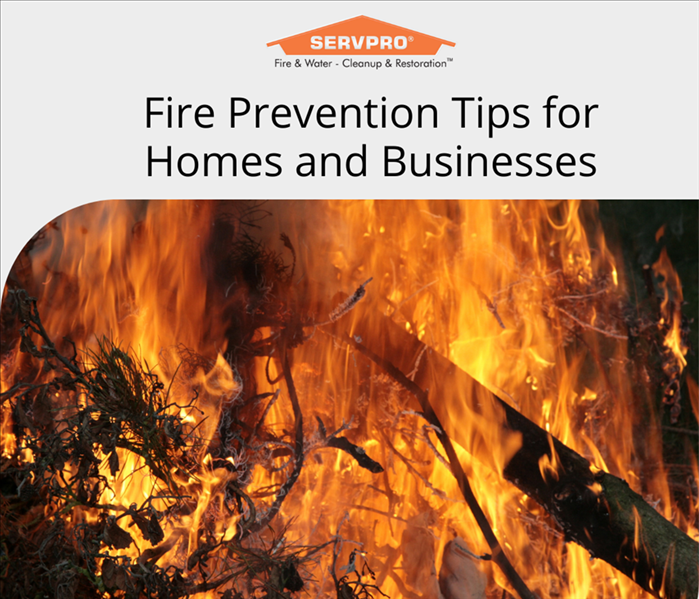 Fire prevention is crucial for safeguarding your home or business.
Fire prevention is crucial for safeguarding your home or business.
Fire prevention is crucial for safeguarding your home or business. Fires can cause devastating damage, but with the right precautions, you can significantly reduce the risk. Whether you're a homeowner or a business owner, following these fire safety tips can help protect your property and loved ones.
1. Install and Maintain Smoke Alarms
Why It Matters: Smoke alarms provide early warnings that can save lives and minimize property damage.
- For Homes: Install smoke alarms in every bedroom, outside sleeping areas, and on each level of your home.
- For Businesses: Place alarms in high-risk areas like kitchens, break rooms, and storage spaces.
- Maintenance: Test smoke alarms monthly, replace batteries yearly, and install new units every 10 years.
2. Practice Safe Cooking Habits
Why It Matters: Cooking is a leading cause of residential fires.
- Never leave cooking food unattended.
- Keep flammable materials—like towels, curtains, and paper—away from stovetops.
- For businesses, ensure kitchen staff are trained in fire safety and equipment use.
3. Use Electrical Systems Safely
Why It Matters: Faulty wiring and overloaded outlets can lead to electrical fires.
- Avoid overloading power strips and outlets.
- Inspect cords regularly and replace damaged ones.
- Hire licensed electricians for regular inspections and repairs.
4. Store Flammable Materials Properly
Why It Matters: Improper storage of flammable materials can increase fire risk.
- Store flammable liquids in original containers, away from heat sources.
- Businesses should comply with OSHA regulations for handling and storing flammable substances.
5. Create and Practice a Fire Escape Plan
Why It Matters: A well-prepared escape plan can save lives.
- For Homes: Develop a plan with two exits per room and a designated meeting point. Practice it regularly.
- For Businesses: Establish an emergency action plan, conduct fire drills, and post clear evacuation routes.
6. Use Heating Equipment Safely
Why It Matters: Space heaters and fireplaces are common causes of winter fires.
- Keep space heaters at least three feet away from anything flammable.
- Schedule annual chimney and fireplace inspections and cleanings.
7. Install Fire Suppression Systems
Why It Matters: Fire extinguishers and sprinklers can control small fires before they spread.
- Place fire extinguishers in easily accessible locations.
- Businesses should install automatic sprinkler systems for added protection.
Fire Damage Restoration & Recovery Services
Even with the best fire prevention measures, accidents can still happen. If your home or business experiences fire damage, professional restoration services are essential.
Our Expert Fire Damage Restoration Services:
- Smoke and Soot Cleanup – Eliminating harmful residue and restoring air quality.
- Odor Removal – Using advanced techniques to remove lingering smoke smells.
- Structural Repairs – Restoring fire-damaged areas to their original condition.
As a trusted leader in fire damage restoration, our highly trained professionals in Natick, Milford, and surrounding areas have the expertise and equipment needed to restore your home or business efficiently.
Protect your property today! Implement these fire safety tips and contact us for expert fire damage restoration when needed.
Fire Damage: What to Do Before Help Arrives
1/16/2025 (Permalink)
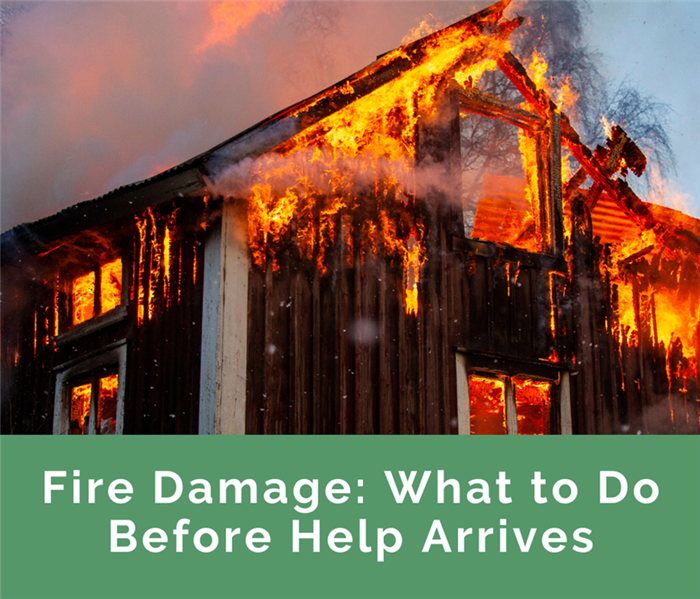 Here’s how to manage fire damage safely until our team arrives
Here’s how to manage fire damage safely until our team arrives
Experiencing a fire can be overwhelming, but taking the right steps afterward can significantly impact the recovery process. Here’s how to manage fire damage safely until our team arrives:
1. Prioritize Safety
Your safety is the top priority. Do not re-enter the property until the fire department confirms it is safe. Be aware of potential risks like structural instability, smoke inhalation, and electrical hazards.
2. Document the Damage for Insurance
When it’s safe to do so, take clear photos and videos of the damage. Proper documentation is essential for filing insurance claims and ensuring you receive the compensation you’re entitled to.
3. Avoid DIY Cleaning
Smoke and soot damage require professional cleaning techniques. Attempting to clean the affected areas on your own can spread harmful contaminants or worsen the damage. Leave the restoration to experts with the right tools and knowledge.
4. Professional Fire and Smoke Restoration
When we arrive, our team will assess the damage, develop a customized restoration plan, and begin cleaning, deodorizing, and repairing your property. We are equipped to handle even the most severe fire damage scenarios.
As a trusted leader in the restoration industry, Natick, Milford, and surrounding areas rely on our advanced training and state-of-the-art equipment to restore homes and businesses efficiently and effectively.
Home Restoration 101: Recovering from Holiday Cooking Mishaps and Kitchen Fires
12/4/2024 (Permalink)
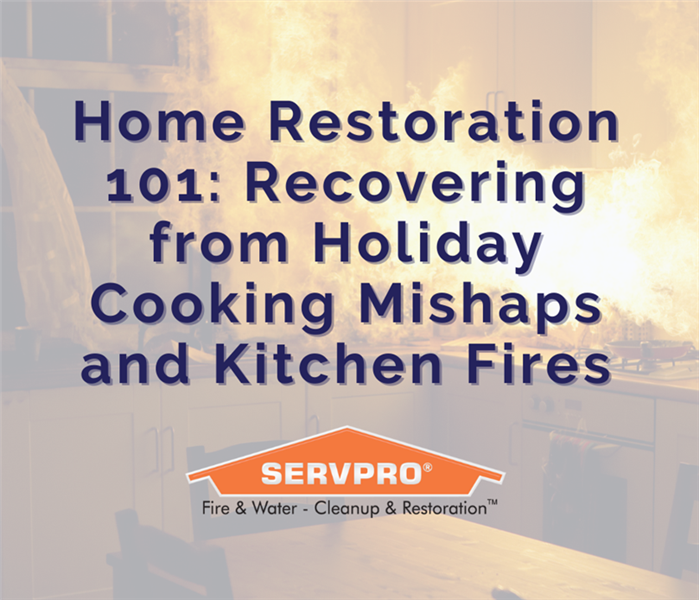 As a trusted leader in restoration, SERVPRO of Natick/Milford has the training and equipment to restore your home
As a trusted leader in restoration, SERVPRO of Natick/Milford has the training and equipment to restore your home
The holiday season brings cherished family gatherings and delicious feasts, but it’s also a time when cooking-related fires are more likely to occur. With the kitchen bustling, accidents can range from minor mishaps to serious fires. Taking preventive steps and knowing how to respond effectively can save you time, stress, and money. Here’s how to keep your kitchen safe and recover if the unexpected happens.
Preventing Holiday Cooking Fires
1. Stay Alert in the Kitchen
With so much activity during the holidays, distractions are common. Make it a rule to never leave a stovetop or oven unattended. If you need to step away, turn off the heat.
2. Avoid Loose Clothing
Long sleeves or loose garments can easily catch fire. Wear snug, short-sleeved clothing or roll up your sleeves when cooking.
3. Keep Flammable Items Away from Heat
Ensure towels, paper products, and wooden utensils are far from burners or open flames. Maintaining a clutter-free workspace reduces fire risks.
4. Have a Fire Extinguisher Ready
Place a kitchen-rated fire extinguisher within easy reach and familiarize yourself with its operation.
5. Be Careful with Oils and Grease
Oil and grease fires are common hazards. Monitor oil temperatures closely, and remember—never use water on a grease fire as it can spread the flames.
What to Do If a Fire Occurs
1. Turn Off the Heat
For stovetop fires, immediately turn off the burner. For an oven fire, turn off the heat and keep the door closed to cut off oxygen.
2. Smother Small Fires
Cover the pan with a metal lid or baking sheet to suffocate flames. Never attempt to extinguish fires with water or flour, which can worsen the situation.
3. Use a Fire Extinguisher if Needed
If flames grow beyond your control, use a fire extinguisher and call emergency services.
4. Ventilate the Area
After extinguishing the fire, open windows and use fans to clear smoke. Avoid using your kitchen vent hood until it’s inspected for damage.
Recovering from Fire or Smoke Damage
1. Assess the Damage
Inspect the affected areas to determine if cleanup or repairs are needed. Soot and smoke stains may appear worse than they are.
2. Clean Soot and Residue
- Soot Removal: Use a vacuum with a brush attachment for loose soot. Avoid wiping, which can spread the residue.
- Smoke Residue: Mix water, vinegar, and mild detergent. Gently clean walls, cabinets, and counters with a sponge. Rinse thoroughly and repeat as needed.
3. Eliminate Lingering Odors
- Ventilation: Open windows and use fans for cross-ventilation.
- Odor Absorbers: Sprinkle baking soda on upholstery and carpets or wipe surfaces with a vinegar solution.
- Activated Charcoal: Place charcoal or run air purifiers with HEPA filters to neutralize odors.
4. Deep Clean Appliances
- Oven and Stovetop: Follow your appliance manual for safe deep cleaning.
- Vent Hood: Remove filters and clean grease buildup. Replace filters if necessary.
5. Seek Professional Help for Severe Damage
If the damage extends beyond the kitchen or involves structural elements, contact a professional restoration service for thorough cleanup and repair.
6. Repair or Replace Damaged Areas
- Cabinets and Counters: Sand and repaint or replace burned or stained sections.
- Flooring: Address warping or stains caused by fire or water with patching or replacement.
Preventing Future Mishaps
- Clean your oven, stovetop, and vent hood regularly to reduce grease buildup.
- Test smoke detectors monthly to ensure they’re operational.
- Educate your family on kitchen fire safety and establish an emergency plan.
Cooking fires are a common holiday hazard, but with proper precautions and a clear recovery plan, you can ensure a safe and festive season.
Need Professional Help?
As a trusted leader in restoration, SERVPRO of Natick/Milford has the training and equipment to restore your home or business.
Holiday Cooking Safety: Tips to Prevent Kitchen Fires
11/15/2024 (Permalink)
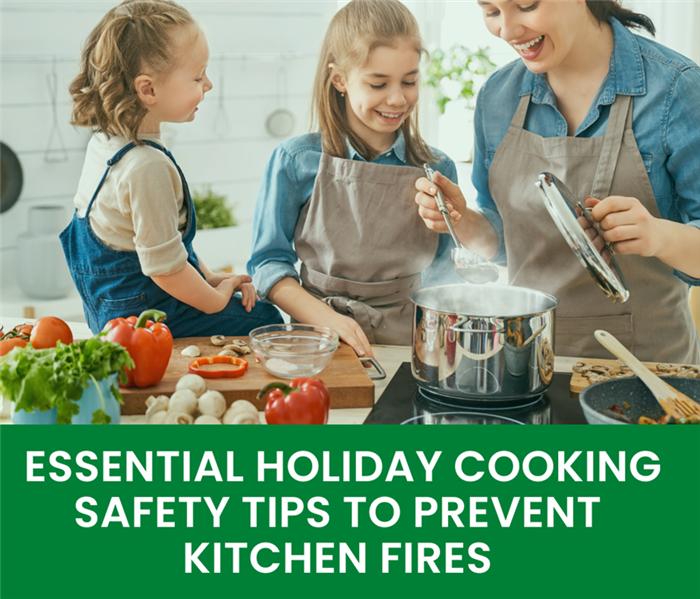 The holiday season is a time for joy, togetherness, and delicious meals, but it’s also when kitchen fires are more likely to occur.
The holiday season is a time for joy, togetherness, and delicious meals, but it’s also when kitchen fires are more likely to occur.
The holiday season is a time for joy, togetherness, and delicious meals, but it’s also when kitchen fires are more likely to occur. With the busy pace of holiday preparations, it’s important to keep safety a top priority in the kitchen. Here are essential tips to help you prevent kitchen fires this holiday season.
1. Stay Present While Cooking
Unattended cooking is the most common cause of kitchen fires. Whether frying, grilling, or simmering, always stay in the kitchen while the stove is on. If you must step away, turn off the heat. Keep flammable items like oven mitts, towels, and paper products away from heat sources to reduce fire risks.
2. Check Smoke Alarms Before Cooking
Before you start preparing meals, make sure your smoke alarms are in working condition. Test them by pressing the test button and replace batteries if needed. A functioning smoke alarm is your first line of defense in a fire emergency.
3. Avoid Overloading Electrical Outlets
The holiday season often brings extra lights, kitchen gadgets, and appliances. Be careful not to overload outlets, as this can lead to overheating and electrical fires. Use surge protectors to safely distribute power and prevent overloading.
4. Handle Candles With Care
Candles add a festive ambiance but can be a fire hazard. Keep them away from flammable materials like curtains, decorations, and wrapping paper. Never leave candles burning unattended, and be sure to extinguish them before leaving the room or going to bed.
5. Deep Frying a Turkey? Use Caution!
Deep-fried turkey is a holiday favorite, but it requires extra care. Always fry your turkey outdoors on a flat, non-flammable surface. Make sure the turkey is fully thawed to avoid oil splatters, which can cause dangerous flare-ups.
6. Clean Ovens and Stove Vents Regularly
Grease buildup in ovens and stove vents is a significant fire hazard. Regularly clean these areas to reduce the risk of grease fires. Don’t forget to check and clean hood filters to keep them free from debris.
By following these tips, you can enjoy a safe and festive holiday cooking experience. Remember, preventing fires starts with awareness and preparation.
If disaster strikes, SERVPRO of Natick/Milford is Here to Help®. With advanced training and equipment, we’re ready to restore your home or business. Call us anytime at (774) 290-4300.
Stay safe, and happy holidays!
Fire Prevention in Commercial Buildings: Safeguarding Your Business During Heating Season
11/6/2024 (Permalink)
 Here’s an overview of common fire risks during heating season and actionable tips to help safeguard your business.
Here’s an overview of common fire risks during heating season and actionable tips to help safeguard your business.
As temperatures drop and heating systems kick in, the risk of fire in commercial buildings rises. Heating equipment, space heaters, and electrical issues are common culprits of fires, especially in colder months. For business owners, proactive fire safety is essential to protect property and employees. Here’s an overview of common fire risks during heating season and actionable tips to help safeguard your business.
Common Fire Risks During Heating Season
Understanding fire hazards associated with heating systems can help you prepare effectively:
1. Heating Systems
While necessary for warmth, heating systems can be a fire hazard if not properly maintained. Malfunctioning furnaces, boilers, and heat pumps may overheat, leak gas, or cause electrical fires. Dust on heating elements and clogged vents also contribute to risks.
2. Space Heaters
Space heaters are a quick way to add warmth, especially in areas where central heating is inadequate. However, they account for a significant number of workplace fires annually. They can overheat, tip over, or ignite nearby materials like paper, curtains, or furniture.
3. Electrical Malfunctions
Electrical fires are also a concern during heating season, as heating appliances can strain a building’s electrical load. Faulty wiring, overloaded circuits, and damaged cords can all lead to sparks and fires. Older buildings are especially vulnerable if their electrical systems haven’t been updated to handle modern power demands.
4. Flammable Materials Near Heat Sources
Storing flammable items, like cleaning supplies or paper, too close to heating sources can quickly escalate a small spark into a major fire. Even furniture placed too close to a heater can ignite and spread fire.
Fire Prevention Tips for Business Owners
Preventing fires in your commercial property requires a blend of maintenance, awareness, and safety protocols. Here are key tips to minimize fire risks:
1. Schedule Regular Heating System Inspections
Ensure your heating system is inspected annually by a licensed HVAC professional. This not only improves efficiency but also reduces fire risks. Technicians can identify issues like gas leaks, faulty wiring, or clogged vents, preventing potential malfunctions.
- Clean Filters and Vents: Clogged filters can cause overheating. Regularly clean or replace filters to maintain airflow and reduce fire hazards.
- Test Smoke and Carbon Monoxide Detectors: Ensure detectors work properly, especially near heating equipment, for early warning of fires or gas leaks.
2. Set Space Heater Safety Guidelines
If space heaters are used in your building, establish clear safety rules to prevent accidents:
- Use Certified Heaters: Ensure all space heaters are certified by recognized labs (e.g., UL, ETL) and have safety features like automatic shut-off.
- Maintain Safe Distance: Place heaters at least three feet away from any flammable items, including paper, furniture, and curtains.
- Turn Off When Unattended: Heaters should be turned off when rooms are empty or at the end of the day. Heaters with timers can help prevent accidental overnight use.
- Use Proper Outlets: Avoid plugging heaters into power strips or extension cords, as they can overload circuits. Plug them directly into wall outlets.
3. Conduct Electrical Safety Checks
Heating season often strains electrical systems, so it’s essential to verify that your wiring can handle the load:
- Inspect Outlets and Cords: Check for frayed cords, loose outlets, or other signs of electrical wear and tear. Replace damaged cords immediately, and avoid running cords under carpets where they can be damaged.
- Monitor Electrical Load: Ensure circuits aren’t overloaded, especially when using heating equipment. An electrician can perform a load test to confirm your system’s capacity.
- Install Ground Fault Circuit Interrupters (GFCIs): GFCIs protect against electrical shocks and fires, especially in wet areas like kitchens. Ensure GFCIs are installed where needed.
4. Create a Fire-Safe Workspace
Maintain a fire-safe environment by following these practices:
- Clear Combustible Clutter: Keep flammable items away from heat sources, including cleaning chemicals, paper, and boxes.
- Designate a Smoking Area: If smoking is allowed, create an outdoor smoking area far from the building, with proper disposal containers for cigarettes.
- Ensure Fire Extinguishers Are Accessible: Place fire extinguishers in high-risk areas like kitchens and mechanical rooms, and train employees on their use.
5. Train Employees on Fire Safety
Regular fire safety training equips employees with the knowledge to prevent and respond to a fire. Topics to include are:
- How to Use a Fire Extinguisher: Train employees on the PASS method—Pull, Aim, Squeeze, and Sweep.
- Evacuation Procedures: Develop and communicate a clear evacuation plan, including exits and assembly points. Hold fire drills regularly.
- Reporting Hazards: Encourage employees to report hazards, like damaged cords or faulty heating equipment, to designated personnel.
Stay Prepared with Professional Assistance
By taking proactive steps—such as scheduling heating system inspections, establishing space heater guidelines, conducting electrical checks, and fostering a fire-safe environment—you can significantly lower fire risks for your business during heating season. Preparation, maintenance, and employee awareness are key to protecting your property and staff.
Our expert team is here to help with fire risk assessments, inspections, and preventive maintenance to keep your commercial property safe throughout winter. Contact us to learn how we can support your fire safety needs this season.
As a leader in restoration, Natick and Milford SERVPRO are equipped with advanced training and tools to restore your business quickly after fire incidents. Call us at (774) 290-4300 for immediate assistance.
How Candles Can Cause Fires and How to Prevent Them
10/18/2024 (Permalink)
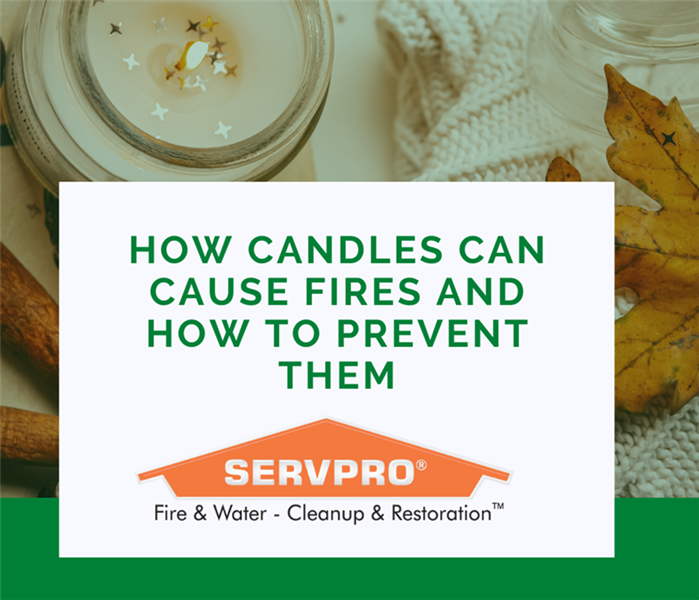 Understanding the risks and learning how to use candles safely is crucial for preventing potential fires.
Understanding the risks and learning how to use candles safely is crucial for preventing potential fires.
Understanding the risks and learning how to use candles safely is crucial for preventing potential fires. Here’s a comprehensive look at how candles can cause fires and how you can mitigate these risks.
1. How Candles Can Cause Fires
Candles are a common source of residential fires. Here are some of the main ways they can become dangerous:
- Unattended Flames: One of the most common causes of candle-related fires is leaving candles unattended. A candle’s flame can easily ignite nearby flammable materials if not watched closely.
- Improper Placement: Placing candles near combustible materials like curtains, paper, or furniture can lead to a fire. Candles should always be placed on a stable, heat-resistant surface away from anything that could catch fire.
- Overuse of Decorative Candles: Candles with decorative elements like leaves, feathers, or ribbons can catch fire if they get too close to the flame. These decorations can be highly flammable and should be avoided or used with caution.
- Failure to Trim Wicks: A wick that’s too long can cause a candle to burn too hot and lead to excessive flame height. This increases the risk of the candle catching nearby materials on fire. It’s essential to trim the wick to about ¼ inch before each use.
- Old or Damaged Candles: Candles that are old or have been improperly stored can become unstable. Cracked or damaged candles can cause uneven burning and increase the risk of fire.
2. Safety Tips for Using Candles
To enjoy the ambiance of candles without compromising safety, follow these important tips:
- Never Leave a Candle Unattended: Always keep an eye on burning candles. Extinguish them before leaving the room or going to sleep.
- Use Candle Holders: Place candles in sturdy, heat-resistant holders that are designed to catch wax drips and contain the flame. Ensure the holder is on a stable, non-flammable surface.
- Keep Candles Away from Flammable Items: Ensure that candles are placed away from curtains, paper, bedding, and other flammable materials. Avoid placing candles in areas where they can be easily knocked over.
- Keep Out of Reach of Children and Pets: Children and pets can accidentally knock over candles or get too close to the flame. Keep candles in locations that are out of their reach.
- Trim Wicks Regularly: Before lighting a candle, trim the wick to about ¼ inch. This helps to control the size of the flame and reduces the risk of a large, uncontrolled fire.
- Extinguish Candles Safely: Use a candle snuffer to extinguish the flame rather than blowing it out, which can spread hot wax. Make sure the candle is completely out and the wick is no longer glowing before leaving it unattended.
3. Alternative Options
If you’re concerned about the risks of traditional candles, consider these safer alternatives:
- Battery-Operated Candles: LED candles offer the appearance of real candles without the fire risk. They can be used safely in many settings and often come with timers and remote controls.
- Electric Wax Warmers: These devices melt wax without a flame, providing the pleasant scent of a candle without the fire risk.
- Scented Oil Diffusers: For a fragrance boost, consider using an oil diffuser. These devices disperse essential oils into the air and are generally safer than burning candles.
4. What to Do in Case of a Candle-Related Fire
In the event of a candle-related fire, act quickly:
- Evacuate Immediately: If a fire occurs, get out of the building as quickly and safely as possible.
- Call 911: Once you are in a safe location, call emergency services to report the fire.
- Do Not Try to Extinguish Large Fires: Leave the firefighting to professionals. Focus on getting yourself and others to safety.
Candles add a touch of elegance and warmth to any environment, but they come with inherent risks. By following safety guidelines and considering alternative products, you can enjoy the beauty of candles while minimizing the risk of fire.
SERVPRO of Natick, Milford is your comprehensive solution for residential and commercial restoration and cleaning services. Our highly trained technicians are available 24/7 to address any water, fire, or storm damage in Natick, MA | Milford, MA | Blackstone, MA | Mendon, MA and surrounding areas.
Essential Tips to Keep Your Home and Family Safe
9/27/2024 (Permalink)
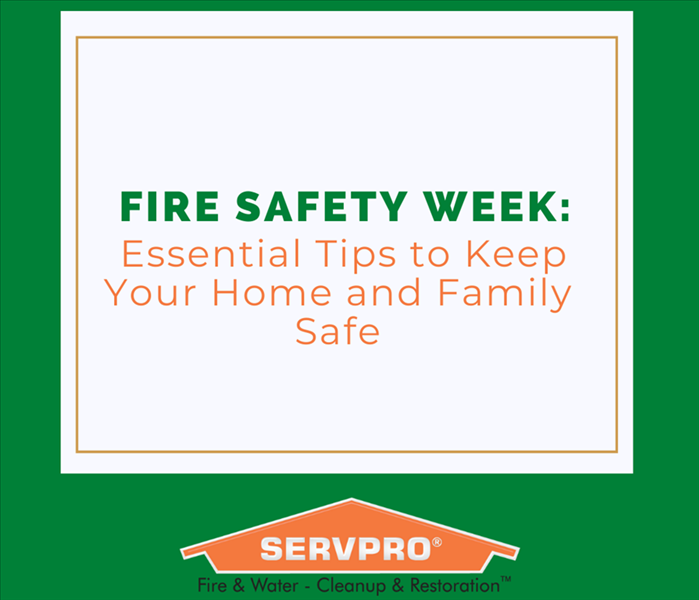 Fire Prevention Week is a perfect opportunity to focus on fire safety
Fire Prevention Week is a perfect opportunity to focus on fire safety
Fire Safety Week is an annual campaign dedicated to educating families and communities about fire hazards and how to prevent them in Natick, MA. This year’s theme emphasizes the importance of preparation and being proactive regarding fire safety. Here’s how you can take action this Fire Safety Week.
1. Check Your Smoke Alarms
Smoke alarms are your first defense against a fire, providing early warnings that give you and your family crucial time to escape. Here’s what you need to do:
- Test alarms regularly: Test all smoke alarms in your home once a month to ensure they function correctly.
- Change the batteries: Replace the batteries in your smoke alarms at least once a year. A good rule of thumb is to change them when you change your clocks for daylight saving time.
- Install alarms in key areas: Every bedroom, hallway, and level of your home should have a smoke alarm.
2. Create a Family Fire Escape Plan
In a fire, every second counts. Having a clear escape plan can save lives. Take time to:
- Identify two exits per room: If one exit is blocked, having a second way out is essential.
- Designate a meeting spot: Choose a safe place outside, away from the house, where everyone should meet in case of a fire.
- Practice regularly: Conduct fire drills with your family at least twice a year so everyone knows what to do in an emergency.
3. Stay Safe in the Kitchen
Cooking is the leading cause of home fires. Here are some simple precautions to prevent kitchen fires:
- Never leave cooking unattended: If you must leave the kitchen, turn off the stove or have someone watch over the cooking.
- Keep flammable objects away from the stove: This includes dish towels, paper towels, and oven mitts.
- Have a fire extinguisher nearby: Know how to use it properly in case of a small fire.
4. Practice Space Heater Safety
As colder weather approaches, space heaters become a common fire risk. Follow these tips to stay warm safely:
- Keep space heaters at least 3 feet away from anything flammable. This includes furniture, curtains, and bedding.
- Turn off heaters when you leave the room or go to bed. Never leave them unattended.
5. Stop Fires Before They Start
While we can't predict when or where a fire will break out, we can reduce the chances by taking proactive steps:
- Keep your home clutter-free: Especially around areas that are prone to fires, like the kitchen and around electrical outlets.
- Check electrical cords: Damaged or frayed wires can cause sparks and lead to fires. Replace cords immediately if you see wear and tear.
- Store flammable materials safely: Items like gasoline, cleaning supplies, and aerosol cans should be kept in well-ventilated areas, away from heat sources.
6. Use Candles Responsibly
While candles can create a cozy atmosphere, they’re also a common fire hazard. If you use candles, be sure to:
- Blow them out before leaving the room. Never leave a candle unattended, especially if children or pets are present.
- Use sturdy candle holders. Make sure the holder is on a flat, stable surface, and away from flammable objects.
Fire Prevention Week is a perfect opportunity to focus on fire safety, but these habits should be practiced year-round. By taking the time to check alarms, create a fire escape plan, and follow these safety tips, you can make your home a safer place for you and your loved ones in Natick, MA.
SERVPRO of Natick, Milford is your comprehensive solution for residential and commercial restoration and cleaning services. Our highly trained technicians are available 24/7 to address any water, fire, or storm damage in Natick, MA | Milford, MA | Blackstone, MA | Mendon, MA and surrounding areas.
The Do’s and Don’ts of Fall Leaf Burning
9/7/2024 (Permalink)
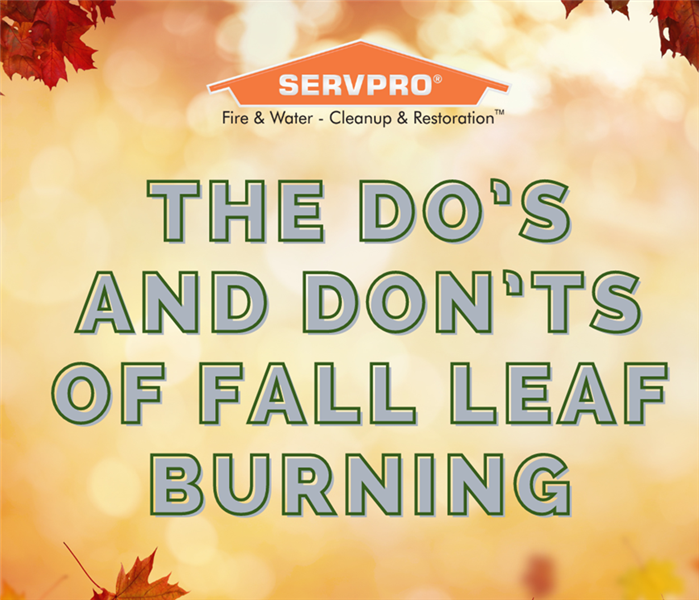 Here’s a guide to help you burn your leaves safely and responsibly in Natick, MA.
Here’s a guide to help you burn your leaves safely and responsibly in Natick, MA.
As the leaves begin to change color and fall, many homeowners find themselves with an abundance of leaves in their yards. While some opt for composting or mulching, others choose to burn their leaves. If you’re considering burning your leaves this fall, it’s crucial to do so safely. Improper leaf burning can lead to wildfires, air pollution. Here’s a guide to help you burn your leaves safely and responsibly in Natick, MA.
The Do’s of Leaf Burning
- Check Local Regulations: Before you even consider burning leaves, it’s important to check your local laws and regulations. Some municipalities have strict rules or outright bans on leaf burning due to environmental concerns or fire risks. Always verify if a permit is needed and understand the guidelines you must follow.
- Choose a Safe Location: Pick a location that’s far from your home, sheds, fences, trees, or any other structures. Ensure there’s at least a 50-foot distance between the burning area and any buildings or flammable materials. A flat, open area with little wind is ideal.
- Create a Firebreak: A firebreak is a barrier that prevents the spread of fire. Surround your burn area with a firebreak made of bare soil or non-flammable materials, such as gravel. This helps contain the fire and keeps it from spreading to unintended areas.
- Burn on a Calm, Dry Day: Wind can cause embers to spread quickly, so only burn on a day with little to no wind. Additionally, wet leaves don’t burn well and can create excessive smoke, so choose a dry day for burning.
- Have Water and Tools Ready: Always have a hose, buckets of water, or a fire extinguisher nearby in case the fire gets out of control. A rake or shovel can also help you manage the fire by spreading out the leaves or smothering any rogue flames.
The Don’ts of Leaf Burning
- Don’t Burn Large Piles: Burning a large pile of leaves can be difficult to control. Instead, burn small piles, adding more leaves as the previous ones burn down. This will make it easier to manage the fire and reduce the risk of it spreading.
- Don’t Burn Near Vegetation or Wooded Areas: Burning leaves too close to trees, bushes, or other vegetation can cause the fire to spread quickly. Always maintain a safe distance from any vegetation to prevent accidental wildfires.
- Don’t Leave the Fire Unattended: Never leave a burning pile of leaves unattended. Stay with the fire at all times, and only burn as much as you can monitor. If you need to step away, extinguish the fire completely before doing so.
- Don’t Burn in High Winds or During a Drought: Wind can carry embers far beyond your burn area, potentially igniting other areas. Similarly, dry conditions during a drought increase the likelihood of wildfires. Avoid burning leaves under these conditions to prevent accidental fires.
- Don’t Use Accelerants: Using gasoline, lighter fluid, or other accelerants to start or maintain your fire is dangerous. These substances can cause the fire to become uncontrollable, leading to serious accidents or injuries. Stick to natural methods, such as matches or a lighter, to start your fire.
Alternative Leaf Disposal Methods
If burning leaves seems too risky, consider these safer alternatives:
- Composting: Turn your leaves into nutrient-rich compost for your garden. Over time, they’ll break down and create a valuable soil amendment.
- Mulching: Shred the leaves and use them as mulch around your plants and trees. This not only recycles the leaves but also helps retain moisture in the soil and suppresses weeds.
- Municipal Collection: Many towns offer curbside leaf collection services. Check with your local government to see if this is an option for you.
Burning leaves can be a convenient way to deal with autumn’s bounty, but it comes with risks.
SERVPRO of Natick, Milford is your comprehensive solution for residential and commercial restoration and cleaning services. Our highly trained technicians are available 24/7 to address any water, fire, or storm damage in Natick, MA | Milford, MA | Blackstone, MA | Mendon, MA and surrounding areas.
Fire Safety During Summer Storms: Tips to Protect Your Property in Blackstone, MA
8/26/2024 (Permalink)
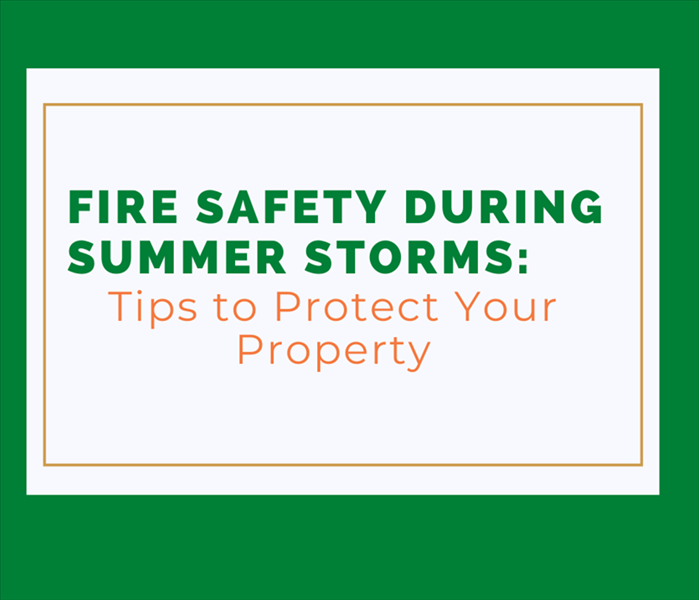 Summer storms bring unique fire hazards that can pose significant risks to your property.
Summer storms bring unique fire hazards that can pose significant risks to your property.
Summer storms bring unique fire hazards that can pose significant risks to your property. Lightning strikes, downed power lines, and other storm-related issues can ignite fires, making it crucial to take proactive measures to safeguard your home. Here are some essential tips to protect your property from fire hazards during summer storms in Blackstone, MA
Lightning Strikes: Lightning is a common cause of fires during summer storms. It can strike trees, power lines, and buildings, sparking fires that spread quickly.
Downed Power Lines: Strong winds and heavy rain can cause power lines to fall, creating sparks that can ignite nearby vegetation or structures.
Power Surges: Electrical storms can cause power surges, potentially leading to fires if your home’s electrical system is not adequately protected.
Tips to Protect Your Property
Use Surge Protectors: Protecting your home’s electrical system from power surges is crucial during summer storms. Here’s how:
- Install Whole-House Surge Protectors: A whole-house surge protector can safeguard your home’s electrical system by diverting excess voltage away from your appliances and wiring.
- Use Point-of-Use Surge Protectors: Plug sensitive electronics, such as computers, televisions, and kitchen appliances, into surge protector power strips.
- Unplug Electronics During Storms: If a severe storm is forecasted, unplug non-essential electronics to prevent damage from potential power surges.
Keep Dry Vegetation Trimmed: Dry vegetation around your home can easily ignite and fuel a fire. Maintaining your landscape is a crucial step in fire prevention:
- Trim Trees and Shrubs: Regularly trim trees and shrubs, especially those near your home and power lines, to prevent them from catching fire if struck by lightning.
- Remove Dead Plants: Clear away dead plants, leaves, and other debris that can act as kindling.
- Maintain a Defensible Space: Create a defensible space around your home by keeping at least a 30-foot radius clear of flammable vegetation and materials.
Maintain Clear Evacuation Routes: In the event of a fire, having clear and accessible evacuation routes is vital for the safety of your family:
- Plan and Practice: Develop an evacuation plan and practice it regularly with all household members. Ensure everyone knows at least two ways to exit each room.
- Keep Exits Clear: Ensure that windows, doors, and pathways are free from obstructions and can be easily accessed in an emergency.
- Emergency Supplies: Prepare an emergency kit with essentials such as water, non-perishable food, medications, and important documents. Keep it in a location that’s easy to grab quickly.
Additional Fire Safety Tips
- Install Smoke Alarms: Ensure smoke alarms are installed on every level of your home and outside sleeping areas. Test them monthly and replace batteries at least once a year.
- Use Fire-Resistant Building Materials: If you’re building or renovating, consider using fire-resistant materials for your roof, siding, and deck to reduce the risk of ignition.
- Stay Informed: Keep an eye on weather forecasts and be aware of any fire weather warnings in your area. Sign up for local emergency alerts to stay informed about potential fire risks.
By understanding the fire hazards associated with summer storms and taking these preventative measures, you can significantly reduce the risk of fire damage to your property. Stay vigilant and proactive to ensure your home and family remain safe during stormy weather.
SERVPRO of Natick, Milford is your comprehensive solution for residential and commercial restoration and cleaning services. Our highly trained technicians are available 24/7 to address any water, fire, or storm damage in Natick, MA | Milford, MA | Blackstone, MA | Mendon, MA and surrounding areas.
Sparkling Celebrations: A Guide to Fireworks Safety
7/4/2024 (Permalink)
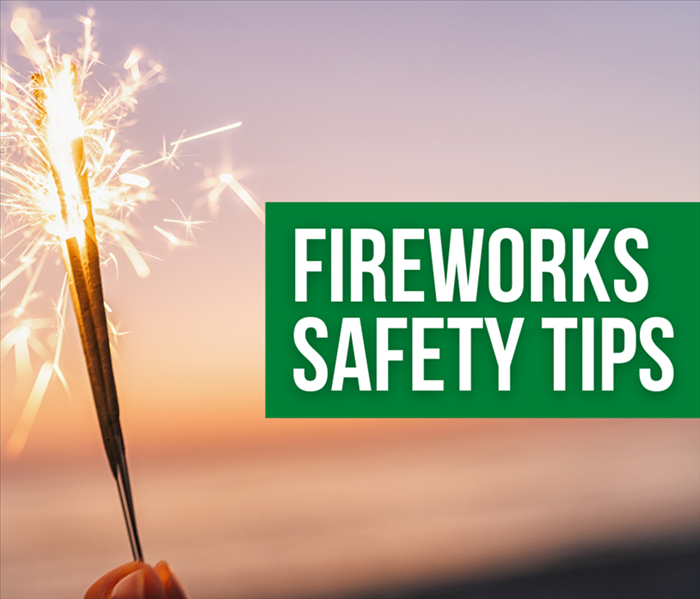 Remember, safety should always be the top priority when handling fireworks.
Remember, safety should always be the top priority when handling fireworks.
Fireworks add excitement and spectacle to any celebration, but they also come with inherent risks. To ensure your festivities are both enjoyable and safe, it's essential to follow proper fireworks safety guidelines. Here are some crucial tips to keep in mind:
Buy from Reliable Sources Purchase fireworks only from licensed and reputable sellers. Homemade or illegal fireworks can be extremely dangerous and unpredictable.
Read the Instructions Before lighting any fireworks, carefully read and understand the instructions provided. Pay attention to recommended safety distances and methods of use to avoid accidents.
Designate a Shooter Assign a responsible adult to handle the fireworks. This person should be sober and free from any impairing substances to ensure safe handling.
Maintain a Safe Distance Keep a safe distance between the fireworks and the audience as per the safety guidelines on the packaging. This distance helps prevent injuries from sparks and debris.
Wear Protective Gear Protect your eyes and ears by wearing safety glasses and ear protection when handling fireworks. Choose cotton clothing over synthetic materials to avoid melting if sparks land on you.
Follow Lighting Instructions Use a flashlight to read labels and fuses in the dark. Light fireworks at arm's length and immediately move away to a safe distance after ignition.
Keep Water Handy Have a bucket of water or a hose nearby to quickly extinguish any fires or mishaps. Always soak used fireworks in water before disposing of them to prevent accidental ignition.
No Relighting If a firework fails to ignite, do not attempt to relight it immediately. Wait at least 20 minutes, then soak it in water before disposal to ensure it's completely inert.
Ensure Pet Safety Keep pets indoors during fireworks displays as the loud noises can frighten them, leading to unpredictable behavior and potential escape.
Follow Local Laws Familiarize yourself with local laws and regulations regarding fireworks usage. Respect any bans or restrictions in your area to avoid legal issues and ensure community safety.
Stay Sober Never handle fireworks if you have consumed alcohol or drugs. Impaired judgment and coordination increase the risk of accidents and injuries.
Dispose of Fireworks Properly After the display, clean up the area promptly. Dispose of fireworks debris in a metal container, as they can remain hot and pose a fire risk if not properly handled.
By following these fireworks safety guidelines, you can enjoy a dazzling display while prioritizing the safety of yourself and those around you. Remember, safety should always be the top priority when handling fireworks.
Choose Expert Cleanup and Restoration Services For reliable assistance with residential and commercial fire, mold, water, and storm damage in Mendon, MA, contact our team today. We're here to help restore your property and ensure peace of mind.
Keep Your Grill Sessions Safe and Fun This Season!
6/8/2024 (Permalink)
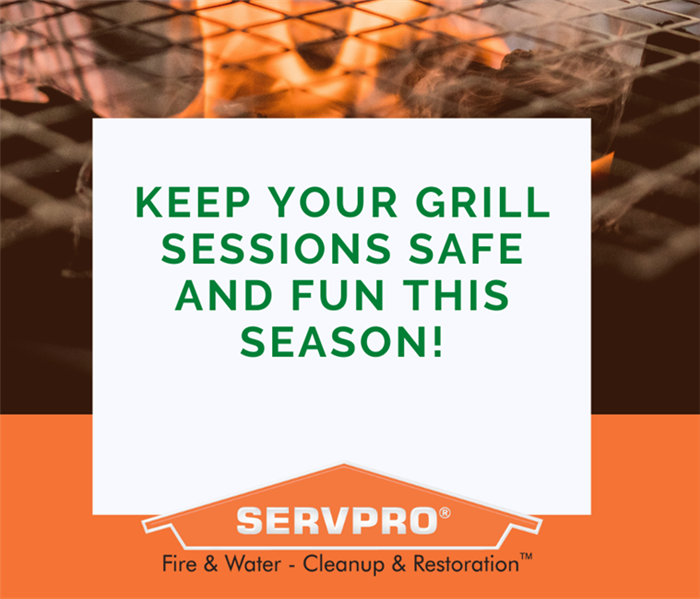 As the weather warms up, it's the perfect time to fire up the grill and enjoy some delicious outdoor cooking with family and friends.
As the weather warms up, it's the perfect time to fire up the grill and enjoy some delicious outdoor cooking with family and friends.
As the weather warms up, it's the perfect time to fire up the grill and enjoy some delicious outdoor cooking with family and friends. However, ensuring safety while grilling is crucial to prevent any fire hazards. Follow these simple tips to keep your grilling sessions safe and fun this season!
Position Your Grill Safely
- Distance Matters: Place your grill at least 10 feet away from your house, deck railings, and overhanging branches.
- Stable Surface: Ensure your grill is on a stable, non-flammable surface to avoid tipping over.
Maintain Your Grill
- Clean Regularly: Grease buildup can cause flare-ups. Clean your grill grates and drip trays before and after each use.
- Check for Leaks: Inspect gas grills for leaks by applying a light soap and water solution to the hose. If bubbles appear, there's a leak.
Safe Lighting Practices
- Open Lid First: Always open the lid before lighting your gas grill to prevent gas buildup.
- Use Long Matches or Lighters: For charcoal grills, use long matches or lighters to ignite safely.
Supervise and Protect
- Never Leave Unattended: Stay close by when grilling to monitor and manage any potential hazards.
- Keep Kids and Pets Away: Maintain a safe zone of at least 3 feet around the grill.
Be Prepared for Emergencies
- Fire Extinguisher: Keep a fire extinguisher nearby and know how to use it.
- Baking Soda and Sand: Have baking soda for grease fires and sand or a bucket of water for charcoal fires.
Remember These Important No-No’s:
- No Flammable Liquids: Never use gasoline or other flammable liquids to start your grill.
- No Grilling Indoors: Grilling indoors or in an enclosed area can lead to carbon monoxide poisoning.
Stay safe, have fun, and enjoy those summer cookouts! Choose the #1 experts in cleanup and restoration for residential and commercial fire, mold, water, and storm damage. Contact us today! We can assist with your damage and restoration needs in Blackstone, MA.
Common Challenges Homeowners May Encounter After A Fire in Hopedale, MA
4/7/2024 (Permalink)
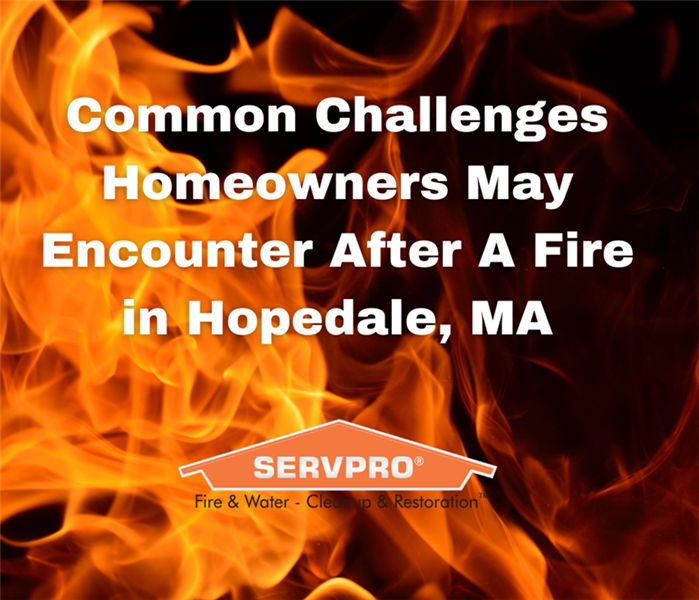 While the road ahead may seem daunting, rebuilding after a fire is possible with patience, determination, and a robust support network.
While the road ahead may seem daunting, rebuilding after a fire is possible with patience, determination, and a robust support network.
After a devastating house fire, the path to recovery can appear overwhelming, fraught with various hurdles to surmount.
Aside from the physical devastation, homeowners often encounter a plethora of challenges as they endeavor to reconstruct their homes and lives. This guide is designed to illuminate some of the most common obstacles homeowners face post-fire and offer practical advice for navigating the rebuilding process.
Dealing with Insurance Claims: One of the initial challenges involves interacting with insurance companies. Understanding the nuances of your policy, meticulously documenting the damage, and negotiating with adjusters can feel daunting. It's crucial to keep detailed records of all communication and damages and consider seeking assistance from a public adjuster if necessary, as they can help ensure you receive fair compensation.
Finding Trustworthy Contractors: Locating reputable contractors to address fire damage repair can be daunting, particularly in high-demand areas. It's essential to thoroughly research potential contractors, check references, and obtain multiple quotes. Working with a contractor specializing in fire damage restoration can streamline the process and ensure a high-quality rebuild.
Coping with Emotional Strain: The emotional impact of losing your home and cherished possessions can be profound. Feelings of grief, anger, and frustration are common reactions. Seeking support from friends, family, or a counselor can provide invaluable assistance in managing these emotions and navigating the rebuilding process with resilience.
Navigating Building Codes and Permits: Rebuilding often entails compliance with complex building codes and obtaining necessary permits. Close collaboration with a contractor familiar with local regulations can ensure your rebuilt home meets all safety standards and avoids potential delays or additional costs.
Managing Financial Stress: Rebuilding can present significant financial challenges, particularly if your insurance coverage is inadequate. Exploring government assistance programs, crowdfunding options, or loan opportunities can help alleviate the financial burden and cover the costs associated with rebuilding.
While the road ahead may seem daunting, rebuilding after a fire is possible with patience, determination, and a robust support network. By seeking help from professionals, staying organized, prioritizing emotional well-being, and maintaining resilience, homeowners can successfully restore their homes and move forward after this traumatic event.
Service Areas
Natick, MA, Milford, MA, Mendon, MA, Blackstone, MA, Holliston, MA, North Natick, MA, South Natick, MA, Hopedale, MA
Smoke Signals: Professional Restoration for a Smoke-Free Environment in Natick Milford.
2/20/2024 (Permalink)
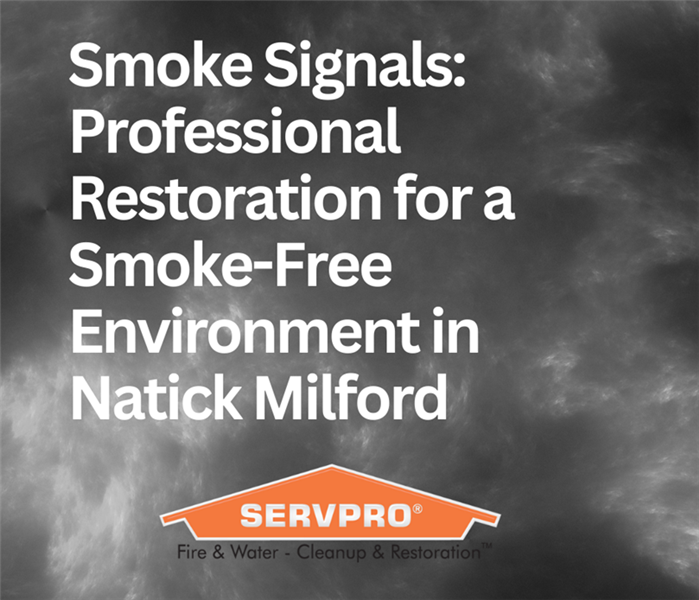 When smoke poses a problem, trust in the proficiency of smoke restoration professionals to reinstate the clarity and purity of your indoor spaces
When smoke poses a problem, trust in the proficiency of smoke restoration professionals to reinstate the clarity and purity of your indoor spaces
Smoke damage can infiltrate every nook and cranny of a property, leaving behind not only visible stains but also stubborn odors. Whether stemming from a fire, tobacco, or other sources, the impact of smoke on indoor spaces can be profound. Discover the significance of professional smoke restoration services in Natick Milford for creating a smoke-free environment and reinstating the quality of indoor areas.
- Comprehending the Complexity of Smoke Damage: Smoke damage transcends surface-level blemishes, involving intricate interactions among various particles and surfaces. Professional smoke restoration services possess a profound understanding of the science behind smoke damage, enabling them to tackle not only apparent signs but also hidden issues like odor infiltration and residue buildup.
- Thorough Evaluation of Smoke Damage: Prior to commencing restoration endeavors, specialists conduct a meticulous assessment to gauge the extent of smoke damage. This entails identifying affected surfaces, materials, and the specific type of smoke residue present. This comprehensive analysis forms the basis for a precise and efficient restoration plan.
- Utilization of Specialized Cleaning Techniques: Smoke restoration experts employ tailored cleaning methods to eradicate smoke residues from surfaces. This may encompass dry cleaning, wet cleaning, or abrasive techniques customized to the materials impacted. The objective is to rejuvenate surfaces to their pre-damage state without causing further harm.
- Implementation of Odor Neutralization Strategies: Lingering smoke odors can persist long after visible damage is rectified. Professional restoration services deploy advanced odor neutralization tactics, including ozone treatments, thermal fogging, and specialized deodorizers. These methods neutralize and eliminate odors at the molecular level, ensuring a genuinely smoke-free environment.
- Cleaning of HVAC Systems: Smoke particles can infiltrate HVAC systems, dispersing odors and contaminants throughout a property. Smoke restoration specialists extend their services to encompass thorough cleaning of ventilation systems, ductwork, and HVAC components. This guarantees that the entire indoor environment is devoid of smoke-related residues.
- Prevention of Cross-Contamination: Throughout the restoration process, experts take measures to prevent cross-contamination to unaffected areas. This involves isolating damaged sections, utilizing containment barriers, and employing air filtration systems to capture and eliminate airborne smoke particles. These precautions are pivotal in averting the spread of residues to other parts of the property.
- Enhancement of Indoor Air Quality: A fundamental aspect of creating a smoke-free environment is enhancing indoor air quality. Professional restoration services prioritize not only visible damage but also the improvement of air quality by eliminating airborne contaminants and ensuring adequate ventilation.
- Post-Restoration Inspection and Testing: To ensure the efficacy of restoration endeavors, professionals conduct post-restoration inspections and testing. This encompasses assessing surfaces, conducting air quality tests, and verifying that all smoke-related issues have been effectively resolved. The ultimate aim is to provide clients with the assurance of a meticulously restored and smoke-free environment.
For individuals and businesses grappling with the aftermath of smoke damage, professional smoke restoration services offer a glimmer of hope. By addressing the multifaceted nature of smoke damage, employing specialized cleaning techniques, and implementing comprehensive odor-elimination strategies, these experts play a pivotal role in creating a genuinely smoke-free indoor environment. When smoke poses a problem, trust in the proficiency of smoke restoration professionals to reinstate the clarity and purity of your indoor spaces in Natick Milford.
SERVPRO Of Natick Milford stands as the premier choice in cleanup and restoration, specializing in fire, mold, water, and storm damage for residential and commercial buildings.
Flames Extinguished, Hopes Rekindled: Top-notch Fire Restoration Services in Natick Milford.
2/14/2024 (Permalink)
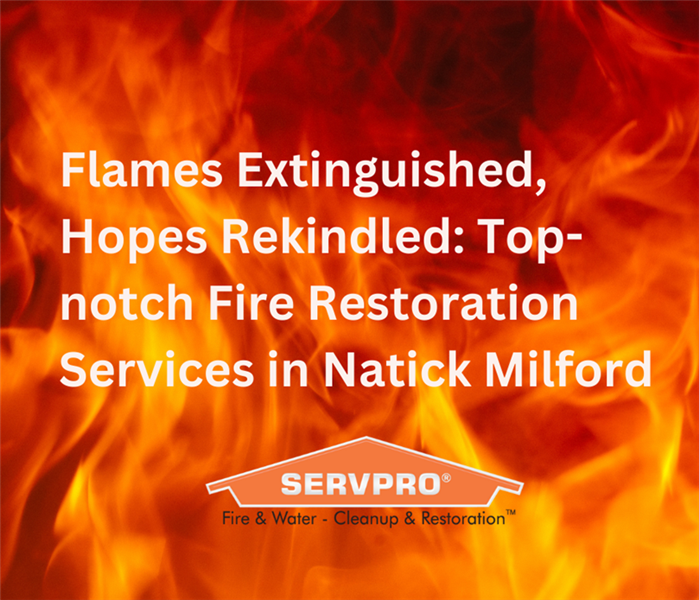 When confronted with the aftermath of a fire, place your trust in the capabilities of fire restoration professionals
When confronted with the aftermath of a fire, place your trust in the capabilities of fire restoration professionals
A fire can leave a trail of devastation and despair in its wake, but as the flames are extinguished, the journey of rebuilding begins. In the aftermath of such a catastrophic event, the significance of top-tier fire restoration services cannot be overstated. Let's delve into the essential role that professional fire restoration experts play in aiding individuals and businesses to rise from the ashes and reignite their hopes.
- Immediate Response for Damage Control: Following a fire, swift action is imperative to prevent further harm. Professional fire restoration services grasp the urgency and respond promptly. Their rapid interventions not only curtail existing damage but also forestall secondary issues, such as water damage from firefighting efforts.
- Thorough Assessment of Fire Damage: Fire's impact is multi-faceted, affecting structures, belongings, and overall property safety. Seasoned fire restoration teams conduct meticulous assessments to gauge the extent of the damage. This comprehensive evaluation serves as the blueprint for crafting a tailored restoration plan to address each case's unique requirements.
- Smoke and Soot Removal: Beyond the visible scars of fire damage, smoke and soot residues can infiltrate every crevice of a property. Professional restoration services employ specialized equipment and techniques to eradicate smoke and soot, ensuring a pristine and safe environment for restoration endeavors.
- Structural Repairs and Reconstruction: Fires often compromise a building's structural integrity. Proficient restoration experts possess the skills to execute structural repairs and reconstruction, guaranteeing that the property not only regains its aesthetic appeal but also meets safety standards.
- Content Restoration and Cleaning: Belongings ravaged by fire and smoke necessitate meticulous restoration. Fire restoration professionals employ cutting-edge cleaning and restoration methods to salvage personal items, furniture, and valuables. This can significantly alleviate the emotional burden for those who have lost cherished possessions.
- Odor Elimination: Lingering odors from smoke and fire can linger long after the flames are extinguished. Fire restoration services deploy specialized deodorization techniques to effectively neutralize odors, fostering a fresh and clean living or working environment.
- Insurance Coordination and Documentation: Navigating insurance claims post-fire can be labyrinthine. Fire restoration experts often lend a helping hand in liaising with insurance providers, documenting the damage, and furnishing accurate assessments. This streamlined approach expedites the insurance claims process for a swifter recovery.
- Emotional Support and Guidance: Fire recovery extends beyond physical restoration; it encompasses emotional healing. Professional fire restoration teams offer invaluable support and guidance, aiding individuals and families in navigating the challenges of rebuilding and reigniting hope for the future.
In the aftermath of a fire, the road to recovery may appear daunting, but with top-tier fire restoration services, flames can be quenched, and hopes can be rekindled. The expertise, efficiency, and compassion of professional fire restoration experts play a pivotal role in helping individuals and businesses emerge from the ashes and rebuild their lives. When confronted with the aftermath of a fire, place your trust in the capabilities of fire restoration professionals to illuminate the path to a brighter and restored future in Natick Milford.
SERVPRO Of Natick Milford stands as the premier choice in cleanup and restoration, specializing in fire, mold, water, and storm damage for residential and commercial buildings.
Understanding the Different Types of Fire and Smoke Damage In Natick Milford MA.
1/23/2024 (Permalink)
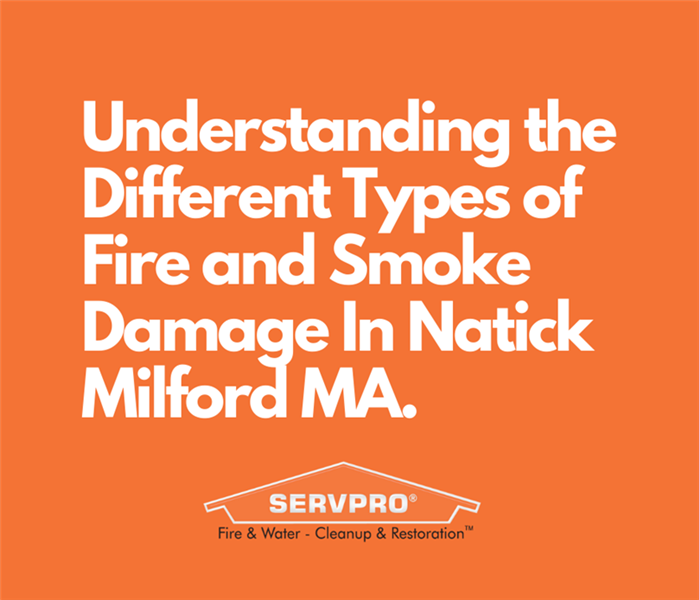 Restoration professionals play a crucial role in assessing and mitigating fire damages.
Restoration professionals play a crucial role in assessing and mitigating fire damages.
Facing a fire is a devastating experience, and the aftermath involves not only the visible destruction caused by flames but also the pervasive impact of smoke.
Fire and smoke damage can vary widely, and understanding the different types is crucial for effective restoration and recovery. Here, we will explore the various types of fire and smoke damage and the challenges associated with each.
Structural Damage:
- Description: Structural damage is the most apparent consequence of a fire, affecting walls, floors, ceilings, and other building components.
- Causes: Direct exposure to flames, high temperatures, and the structural integrity of materials being compromised during a fire.
- Challenges: Assessing and repairing structural damage often requires collaboration between structural engineers, contractors, and restoration specialists.
Soot Damage:
- Description: Soot is a fine, black residue composed of carbon particles produced by incomplete combustion. It can cover surfaces and belongings, leaving behind a distinct odor and staining.
- Causes: Incomplete combustion of organic materials during a fire, releasing fine particles that settle on surfaces.
- Challenges: Cleaning soot requires specialized techniques and equipment to prevent smearing and further damage.
Smoke Damage:
- Description: Smoke damage encompasses the impact of smoke on surfaces, belongings, and indoor air quality. It often manifests as discoloration, odors, and corrosive residues.
- Causes: The complex mixture of gases, chemicals, and particles released during a fire that adhere to surfaces and materials.
- Challenges: Proper ventilation, air purification, and targeted cleaning are essential to address smoke damage comprehensively.
Water Damage:
- Description: Water damage is a secondary consequence of firefighting efforts, as water is used to extinguish flames. It can lead to issues such as mold growth and structural deterioration.
- Causes: Firefighters' efforts to extinguish the fire using water or other suppressants.
- Challenges: Swift water extraction, drying, and dehumidification are critical to prevent further damage and mitigate the risk of mold growth.
Corrosion Damage:
- Description: Corrosion occurs when acidic byproducts of combustion react with metals, leading to deterioration and discoloration.
- Causes: Interaction between acidic residues in smoke and metal surfaces.
- Challenges: Prompt cleaning and treatment of metal surfaces to prevent irreversible corrosion damage.
Odor Damage:
- Description: Lingering odors are a common issue after a fire, caused by the combustion of various materials.
- Causes: Absorption of smoke particles into porous surfaces, making odors difficult to eliminate.
- Challenges: Odor removal requires specialized techniques, such as ozone treatment or thermal fogging, to neutralize and eliminate persistent smells.
Dealing with the aftermath of a fire involves addressing various types of damage, each requiring specific expertise and techniques. Restoration professionals play a crucial role in assessing and mitigating these damages, helping individuals and businesses rebuild and recover from the devastating effects of fire and smoke. Understanding the nuances of different types of fire and smoke damage is a key step in the restoration process, ensuring a comprehensive and effective approach to recovery in Natick, Milford MA.
Electrical Fire Safety: Protecting Your Home and Business In Natick Milford MA.
1/8/2024 (Permalink)
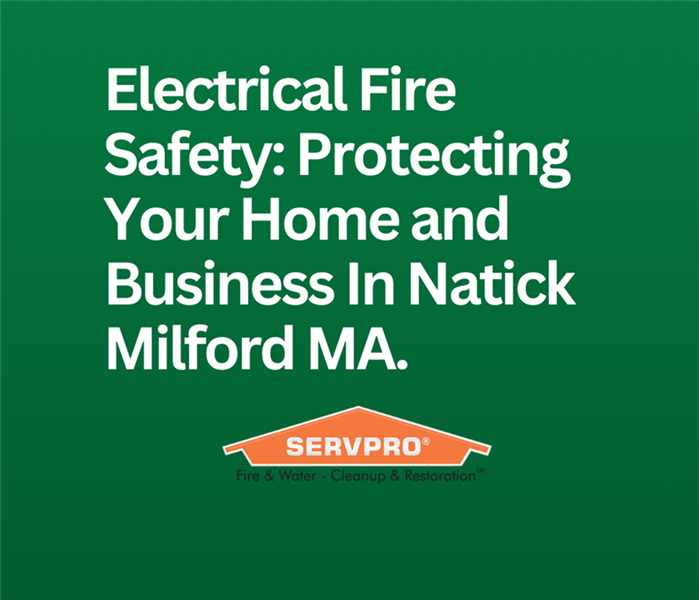 By staying vigilant, conducting regular inspections, and implementing safety measures, you can significantly reduce the risk of electrical fires.
By staying vigilant, conducting regular inspections, and implementing safety measures, you can significantly reduce the risk of electrical fires.
Electricity is an indispensable part of our daily lives, illuminating our homes and powering our businesses.
However, with this convenience comes inherent risks, and electrical fires pose a grave threat to both life and property. Understanding electrical fire safety is paramount in minimizing these risks and ensuring the well-being of occupants. Let's delve into key measures to enhance electrical fire safety both at home and in the workplace.
Common Causes of Electrical Fires:
- Faulty Wiring: Aging or improperly installed wiring can lead to electrical fires. Regular inspections and maintenance are crucial to identifying and rectifying potential issues.
- Overloaded Circuits: Plugging too many devices into a single outlet or overloading circuits can generate excessive heat, leading to sparks and fires. Distribute electrical loads evenly and avoid daisy-chaining multiple power strips.
- Malfunctioning Appliances: Appliances with damaged cords or internal components can become fire hazards. Regularly inspect and replace damaged cords, following manufacturer guidelines for maintenance.
- Electrical Equipment Issues: Faulty electrical equipment, such as circuit breakers or outlets, can contribute to electrical fires. Ensure that all electrical components are in good working condition and promptly address any malfunctions.
- Flammable Materials Near Outlets: Placing flammable materials, such as curtains or paper, near electrical outlets or equipment increases the risk of fire. Keeping these areas clear minimizes potential hazards.
Electrical Fire Safety Tips for Homes and Businesses:
- Regular Inspections and Maintenance: Schedule regular inspections of your electrical system, especially in older homes or buildings. Look for signs of wear and tear, exposed wires, or scorch marks. Hire a qualified electrician to address any issues promptly.
- Avoid Overloading Circuits: Be mindful of the number of devices plugged into outlets and avoid overloading circuits. Use power strips with built-in surge protection to safeguard against voltage spikes.
- Proper Use of Extension Cords: Use extension cords temporarily and avoid using them as permanent solutions. Never daisy-chain multiple extension cords together.
- Upgrade Wiring and Electrical Panels: If your home or business has outdated wiring or electrical panels, consider upgrading to meet current safety standards. This can significantly reduce the risk of electrical fires.
- Appliance Safety: Regularly check appliances for signs of damage, replace frayed or worn-out cords, and follow manufacturer guidelines for maintenance. Avoid leaving appliances unattended when in use.
- Install Smoke Alarms: Ensure that smoke alarms are installed in key areas of your home or business. Regularly test and replace batteries to guarantee their functionality.
- Emergency Response Plan: Develop and communicate an emergency response plan that includes procedures for dealing with electrical fires. Ensure that all occupants are aware of evacuation routes and the location of fire extinguishers.
Electrical fire safety is a shared responsibility that demands diligence and proactive measures. By staying vigilant, conducting regular inspections, and implementing safety measures, you can significantly reduce the risk of electrical fires at home and in the workplace. Prioritize electrical safety to protect not only property but, more importantly, the safety and well-being of the people in your care. Stay informed, stay safe, and empower others with the knowledge needed to prevent electrical fires in Natick, Milford MA.
What to Do in the Event of a Fire in Natick Milford, MA
12/8/2023 (Permalink)
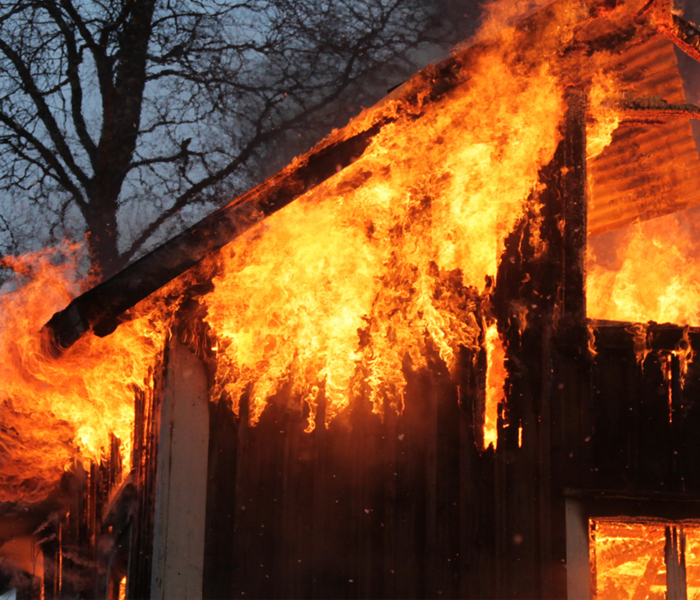 Preparedness for a fire emergency involves education, awareness, and practice.
Preparedness for a fire emergency involves education, awareness, and practice.
Fires, characterized by their unpredictable nature and rapid escalation, pose a grave threat to both life and property.
Whether encountered at home, work, or in public spaces, the key to mitigating this danger lies in preparedness and knowing how to respond effectively. Gain practical insights into calmly and efficiently addressing fire emergencies in Natick Milford, MA.
Maintain Composure and Stay Alert:
In any emergency, the foremost and pivotal step is to remain calm. Panic can impede clear thinking and swift decision-making. Whether you come across a fire or hear a fire alarm, keep your composure and alert those in your vicinity. Time is critical in fire emergencies, and a composed mindset facilitates prompt, necessary actions.
- Prompt Evacuation: Prioritize your safety and that of others. If the fire is small and manageable, use a suitable fire extinguisher. However, if the fire is spreading or you feel unsafe, vacate the area immediately. Do not waste time gathering belongings; evacuate swiftly.
- Adhere to Exit Routes: In public places or buildings, acquaint yourself with exit routes and emergency exits. During a fire, calmly follow these routes and assist others, especially those with mobility issues or disabilities. Avoid elevators; use stairwells.
- Navigate Low in Smoke: Smoke inhalation poses a significant risk during fires. If smoke is present, stay close to the ground where the air is clearer. Crawling low reduces the risk of inhaling harmful gases and enhances the likelihood of reaching safety.
- Summon Assistance: Once outside, promptly call emergency services, providing accurate information about the fire's location and nature. Refrain from re-entering the building unless directed by emergency personnel.
- Gather at a Designated Meeting Point: In residential complexes or workplaces, establish a meeting point a safe distance from the building. This ensures quick accountability and provides accurate information to emergency responders.
- Avoid Re-entry: Under no circumstances should you re-enter a burning building. Allow trained firefighters to manage the situation, as re-entry poses extreme danger and can result in severe injuries or loss of life.
Embrace Fire Prevention Practices:
Fire prevention is as crucial as knowing how to respond. Regularly check smoke detectors, electrical systems, and heating appliances. Avoid overloading electrical outlets and practice safe cooking habits. Proactive fire prevention significantly reduces the risk of outbreaks.
Preparedness for a fire emergency involves education, awareness, and practice. By staying calm, evacuating promptly, and adhering to established safety procedures, you can safeguard yourself and others. Regular review and practice of these steps ensure readiness to respond effectively, contributing significantly to overall community safety.
SERVPRO Of Natick Milford is The #1 Choice in Cleanup and Restoration for residential and commercial buildings’ fire damage.
A Guide to Thanksgiving Fire Safety in Natick Milford MA
11/8/2023 (Permalink)
 SERVPRO Of Natick Milford is The #1 Choice in Cleanup and Restoration for residential and commercial buildings’ fire damage.
SERVPRO Of Natick Milford is The #1 Choice in Cleanup and Restoration for residential and commercial buildings’ fire damage.
Immerse yourself in the delightful fragrance of roasted turkey, the comforting warmth of pumpkin pie, and the joyous gathering of loved ones as you create a festive Thanksgiving atmosphere. Amidst the celebrations, it is crucial to prioritize safety, particularly regarding potential fire hazards. Explore these Thanksgiving fire safety tips to ensure that your holiday remains a time of gratitude and joy.
Kitchen Safety: At the heart of Thanksgiving lies the kitchen, where the magic of the feast unfolds.
- Never leave the stove unattended, especially when cooking with oils or frying.
- Keep flammable items, such as kitchen towels and oven mitts, away from the stovetop.
- Ensure that your smoke alarms are functioning correctly, and keep a fire extinguisher within easy reach.
Turkey Fryer Safety: Deep-frying turkeys have evolved into a popular Thanksgiving tradition, but it come with inherent risks.
- Set up the fryer outdoors, away from the house, deck, or any flammable materials.
- Thaw the turkey completely before frying to avoid oil splatters.
- Monitor the temperature of the oil closely and never overfill the fryer.
Candle Caution: Candles can add a warm and cozy ambiance to your Thanksgiving dinner, but they also pose a fire risk.
- Keep candles away from flammable decorations and other items.
- Place candles in sturdy, non-tip candle holders.
- Never leave lit candles unattended, and extinguish them before leaving the room.
Electrical Safety: Thanksgiving often involves a multitude of electrical appliances and devices.
- Avoid overloading electrical outlets and use surge protectors when necessary.
- Inspect cords for any frays or damage and replace them if needed.
- Turn off appliances when not in use, and unplug them if possible.
Keep an Eye on Children: Children, while adding to the joy of the season, can be curious and unaware of potential dangers.
- Designate a kid-free zone in the kitchen.
- Educate children about fire safety and the importance of staying away from hot surfaces.
- Assign a responsible adult to supervise young children during festivities.
Prioritizing safety is paramount, particularly concerning potential fire hazards. SERVPRO Of Natick Milford is The #1 Choice in Cleanup and Restoration for residential and commercial buildings’ fire damage. Call us today at (774) 290-4300.
A Guide to Christmas Fire Safety in Natick Milford MA
11/8/2023 (Permalink)
 Amidst the festivities, it's crucial to prioritize safety, especially when it comes to fire safety during the holidays.
Amidst the festivities, it's crucial to prioritize safety, especially when it comes to fire safety during the holidays.
As the holiday season approaches, families gather, homes are adorned with twinkling lights and decorations, and the aroma of delicious meals fills the air. However, amidst the festivities, it's crucial to prioritize safety, especially when it comes to fire safety during the holidays. Here are some essential tips to ensure a Merry and safe Christmas for you and your loved ones.
Mindful Decoration Placement:
Decking the halls with festive decorations is a cherished Christmas tradition. However, it's essential to be mindful of where and how you place them. Keep flammable materials such as curtains, tablecloths, and other decorations away from heat sources like candles and fireplaces. Opt for flame-resistant or flame-retardant decorations whenever possible.
Candle Safety:
Candles create a warm and cozy atmosphere, but they also pose a significant fire hazard. If you enjoy the glow of candlelight, consider using flameless LED candles as a safer alternative. If you do use traditional candles, never leave them unattended, keep them away from children and pets, and ensure they are placed in stable holders on a flat surface.
Inspect Christmas Lights:
Before hanging up your Christmas lights, inspect them for any signs of damage such as frayed wires, broken bulbs, or exposed wires. Discard and replace any damaged lights, and always follow the manufacturer's guidelines for usage. Consider using LED lights, as they generate less heat and are more energy-efficient than traditional incandescent lights.
Mindful Tree Care:
If you have a live Christmas tree, keeping it well-hydrated is crucial for fire prevention. Dry trees are highly flammable, so be sure to water your tree regularly and keep it away from heat sources. If you opt for an artificial tree, ensure that it is labeled as flame-resistant.
Cooking Safety:
The Christmas feast is a central part of the celebration, but it's also a time when kitchen fires are more common. Stay vigilant while cooking, use timers to avoid overcooking, and keep flammable items like kitchen towels and oven mitts away from the stove. If deep-frying, do so outside and away from structures.
Have an Escape Plan:
In the unfortunate event that a fire does occur, it's crucial to have a well-thought-out escape plan. Ensure that everyone in the household knows the plan, including designated meeting points outside the home. Practice fire drills regularly, especially if you have guests staying with you over the holidays.
Christmas is a time for joy, warmth, and togetherness. By taking simple precautions and being mindful of fire safety, you can ensure that the holiday season remains merry and bright for everyone. SERVPRO Of Natick Milford is The #1 Choice in Cleanup and Restoration for residential and commercial buildings’ fire damage. Call us today at (774) 290-4300.
A Guide to Christmas Fire Safety in Natick Milford MA
11/8/2023 (Permalink)
 Amidst the festivities, it's crucial to prioritize safety, especially when it comes to fire safety during the holidays.
Amidst the festivities, it's crucial to prioritize safety, especially when it comes to fire safety during the holidays.
As the holiday season approaches, families gather, homes are adorned with twinkling lights and decorations, and the aroma of delicious meals fills the air. However, amidst the festivities, it's crucial to prioritize safety, especially when it comes to fire safety during the holidays. Here are some essential tips to ensure a Merry and safe Christmas for you and your loved ones.
Mindful Decoration Placement:
Decking the halls with festive decorations is a cherished Christmas tradition. However, it's essential to be mindful of where and how you place them. Keep flammable materials such as curtains, tablecloths, and other decorations away from heat sources like candles and fireplaces. Opt for flame-resistant or flame-retardant decorations whenever possible.
Candle Safety:
Candles create a warm and cozy atmosphere, but they also pose a significant fire hazard. If you enjoy the glow of candlelight, consider using flameless LED candles as a safer alternative. If you do use traditional candles, never leave them unattended, keep them away from children and pets, and ensure they are placed in stable holders on a flat surface.
Inspect Christmas Lights:
Before hanging up your Christmas lights, inspect them for any signs of damage such as frayed wires, broken bulbs, or exposed wires. Discard and replace any damaged lights, and always follow the manufacturer's guidelines for usage. Consider using LED lights, as they generate less heat and are more energy-efficient than traditional incandescent lights.
Mindful Tree Care:
If you have a live Christmas tree, keeping it well-hydrated is crucial for fire prevention. Dry trees are highly flammable, so be sure to water your tree regularly and keep it away from heat sources. If you opt for an artificial tree, ensure that it is labeled as flame-resistant.
Cooking Safety:
The Christmas feast is a central part of the celebration, but it's also a time when kitchen fires are more common. Stay vigilant while cooking, use timers to avoid overcooking, and keep flammable items like kitchen towels and oven mitts away from the stove. If deep-frying, do so outside and away from structures.
Have an Escape Plan:
In the unfortunate event that a fire does occur, it's crucial to have a well-thought-out escape plan. Ensure that everyone in the household knows the plan, including designated meeting points outside the home. Practice fire drills regularly, especially if you have guests staying with you over the holidays.
Christmas is a time for joy, warmth, and togetherness. By taking simple precautions and being mindful of fire safety, you can ensure that the holiday season remains merry and bright for everyone. SERVPRO Of Natick Milford is The #1 Choice in Cleanup and Restoration for residential and commercial buildings’ fire damage. Call us today at (774) 290-4300.
Protecting Your Home: A Comprehensive Guide to Fire Prevention
10/4/2023 (Permalink)
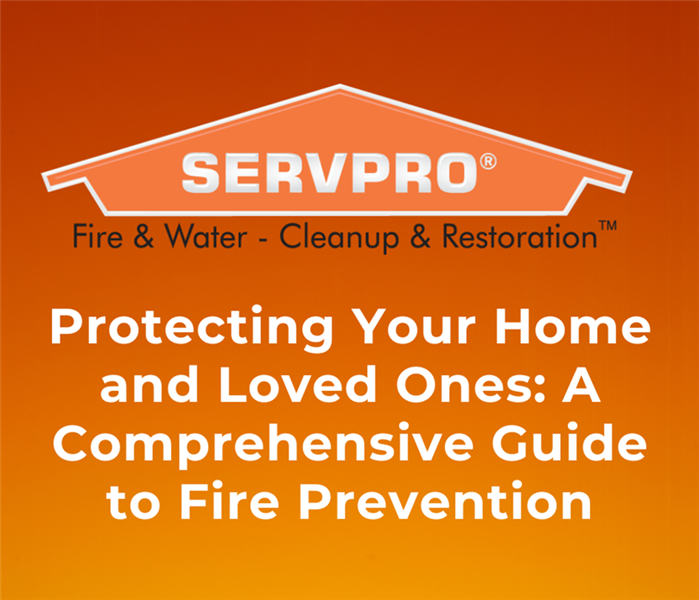 Here are crucial guidelines for fire prevention.
Here are crucial guidelines for fire prevention.
Preventing fires requires a collective commitment to awareness, precautions, and responsible conduct.
Here are crucial guidelines for fire prevention:
- Install Smoke Alarms: Ensure that smoke alarms are in place in critical areas such as bedrooms, hallways, and the kitchen. Regularly test and replace batteries annually.
- Create a Fire Escape Plan: Familiarize everyone in your household with a comprehensive fire escape plan, including multiple exit routes, a designated meeting point outside, and the procedure for calling 911. Regularly practice fire drills.
- Fire-Resistant Building Materials: When constructing or renovating, consider incorporating fire-resistant materials like roofing, siding, and insulation to slow the spread of flames and enhance the chances of containment.
- Properly Store Flammable Materials: Store flammable substances, including gasoline and paints, in well-ventilated areas away from heat and open flames. Utilize suitable containers and adhere to safety guidelines to prevent leaks.
- Maintain Heating Equipment: Regularly inspect and maintain heating equipment, such as fireplaces and furnaces, with professional assistance. Keep flammable items at a safe distance and employ protective barriers to prevent sparks.
- Safe Cooking Practices: Never leave the kitchen unattended while cooking, and keep flammable items away from the stove. Install a fire extinguisher nearby and acquaint yourself with its usage.
- Electrical Safety: Inspect electrical systems, cords, and outlets for damage regularly. Replace faulty components, avoid overloading outlets, and use surge protectors when necessary.
- Candle Safety: Keep candles away from flammable materials and never leave them unattended. Consider using flameless LED candles for a safer alternative.
- Smoking Safety: If you smoke, do so outside using a sturdy ashtray. Ensure cigarettes are fully extinguished before disposal and avoid smoking in bed to prevent potential fire hazards.
- Teach Fire Safety to Children: Educate children about fire safety, emphasizing the dangers of fire, appropriate responses, and the importance of avoiding matches and lighters.
By adhering to these fire prevention measures and instilling a safety culture in your household, you can substantially mitigate the risk of fires and safeguard your home and loved ones from this destructive force in Natick Milford MA. Remember, in fire prevention, an ounce of prevention is worth a pound of cure. Stay safe, prepared, and protect your home in Milford, MA.
SERVPRO® Of Natick Milford is The #1 Choice in Cleanup and Restoration for residential and commercial buildings’ fire, mold, water, and storm damage. Call us today at (774) 290-4300.
5 Things Not to Do After a Fire Damages Your Home in Natick Milford, MA.
8/23/2023 (Permalink)
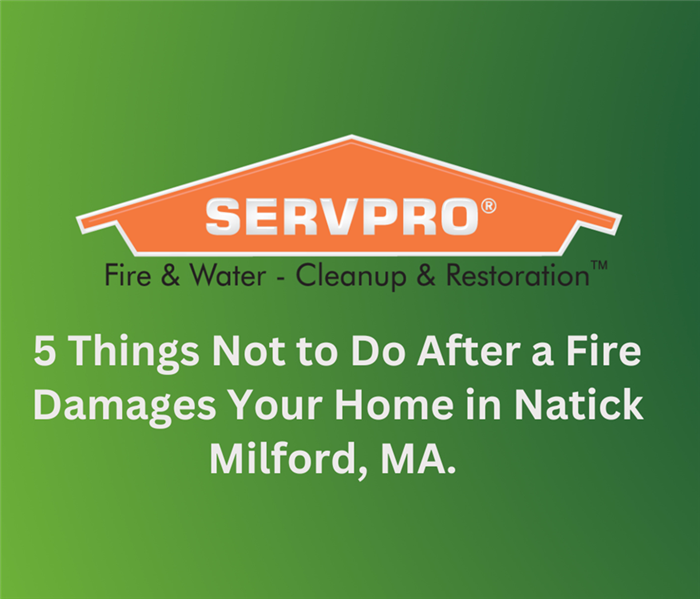 SERVPRO of Natick Milford provides cleanup and restoration services for fire, mold, water, and storm damage in residential and commercial buildings
SERVPRO of Natick Milford provides cleanup and restoration services for fire, mold, water, and storm damage in residential and commercial buildings
Experiencing a house fire is a devastating event that can leave you feeling overwhelmed and uncertain about what steps to take next. After the fire is extinguished and the immediate danger is over, it's essential to approach the situation with caution and a clear plan. While the desire to start restoring your home may be strong, there are several critical mistakes you should avoid to ensure a smoother recovery process.
- Entering the Property Without Proper Clearance: After a fire, your instinct may be to rush back into your home to assess the damage and retrieve valuables. However, entering the property without proper clearance from the fire department or relevant authorities can be extremely dangerous. Structural instability, hidden pockets of fire, toxic fumes, and weakened support beams are just a few of the hazards that might be present. Always wait for the official go-ahead before reentering your home to ensure your safety and that of emergency responders.
- Attempting DIY Repairs: Restoring your home after a fire requires professional expertise due to the complexity of the damage. While it's natural to want to start cleaning up immediately, attempting DIY repairs without the necessary knowledge and equipment can lead to further damage and compromise the integrity of your home. Instead, consult with licensed contractors or restoration specialists experienced in fire damage recovery. They will have the expertise and tools needed to assess the situation correctly and carry out safe and effective restoration work.
- Ignoring Smoke and Soot Damage: The aftermath of a fire often leaves behind extensive smoke and soot damage that may not be immediately apparent. Ignoring these lingering issues can lead to long-term problems, including health hazards and deterioration of materials. Smoke and soot particles can seep into walls, upholstery, and ventilation systems, causing respiratory issues and unpleasant odors. Engage professional cleaning services equipped to handle fire-related residues to ensure that your home is thoroughly cleaned and deodorized.
- Failing to Notify Your Insurance Company Promptly: Your homeowner's insurance policy is there to help you during such challenging times, but to maximize your claim and coverage, it's crucial to notify your insurance company promptly. Delaying the reporting of the fire or providing incomplete information may lead to complications and delays in receiving the necessary funds for the restoration process. Reach out to your insurance provider as soon as possible, providing detailed documentation of the damage and any valuable items that were lost.
- Disposing of Damaged Items Prematurely: Amidst the chaos of a fire-damaged home, it's tempting to discard ruined items quickly. However, it's essential to document the damage thoroughly before disposing of anything. Take photographs and make a detailed inventory of damaged belongings as evidence for your insurance claim. Your insurance adjuster may need this information to process your claim accurately. Moreover, some items may be salvageable through professional restoration services, potentially saving you money in replacement costs.
Experiencing a fire and the aftermath of its damage is an emotional and challenging ordeal. While the desire to start rebuilding your life is natural, it's essential to approach the recovery process cautiously and avoid certain mistakes. Remember not to enter your property until it's deemed safe, enlist the help of professionals for restoration work, promptly inform your insurance company, and document the damage thoroughly.
When it comes to cleanup and restoration services for fire, mold, water, and storm damage in residential and commercial buildings, SERVPRO of Natick Milford proudly holds the top position as the number one choice. Our comprehensive services cover a wide range of areas, including Blackstone, Hopedale, Mendon, Milford, Natick, North Natick, and South Natick, MA. Rest assured, we are here to provide unmatched expertise and efficiency to restore your property to its former glory.
How to Deal with Fire and Smoke Damage in a Home or Business in Natick Milford, MA
6/7/2023 (Permalink)
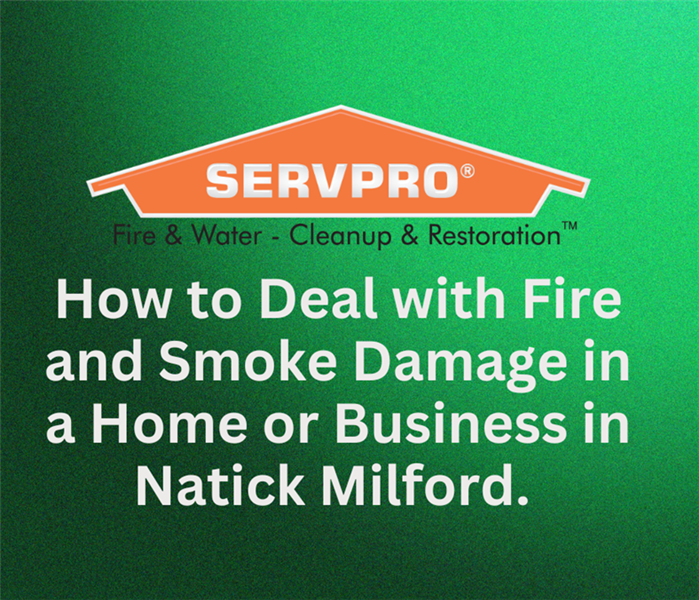 SERVPRO Of Natick Milford, is The #1 Choice in Cleanup and Restoration for residential and commercial buildings’ fire, mold, water, and storm damage.
SERVPRO Of Natick Milford, is The #1 Choice in Cleanup and Restoration for residential and commercial buildings’ fire, mold, water, and storm damage.
Fire and smoke damage can present significant challenges. Here are steps to help you navigate the recovery process successfully.
- Ensure Safety: It is crucial to wait for approval from the fire department or relevant authorities that the building is structurally safe.
- Contact Professionals: Once the property is deemed safe to enter, contact your reputable fire damage restoration SERVPRO Of Natick Milford, MA. We have the expertise, experience, and specialized equipment to handle fire and smoke damage effectively.
- Document the Damage: Before any cleanup or repairs take place, document the damage thoroughly. Take photographs and make a detailed inventory of all affected items and structural damage.
- Ventilate the Area: Open windows and doors to allow fresh air to circulate throughout the space. This helps to dissipate residual smoke and reduce odors. However, exercise caution if there is significant structural damage, as opening windows or doors could pose safety risks.
- Clean and Remove Soot: Soot and smoke residues can cause significant damage if left untreated. Consider SERVPRO Of Natick Milford, MA for thorough cleaning and restoration of delicate items such as textiles, electronics, and artwork.
- Assess and Repair Structural Damage: Evaluate the structural integrity of your property and address any immediate concerns. Seek assistance from a licensed contractor or structural engineer to determine the extent of the damage and develop a plan for repairs or rebuilding.
- Eliminate Odors: Begin by airing out the space and using fans or dehumidifiers to promote air circulation.
Remain patient and resilient throughout the recovery process, as restoring your property to its preloss condition may take time.
SERVPRO Of Natick Milford, MA is The #1 Choice in Cleanup and Restoration for residential and commercial buildings’ fire, mold, water, and storm damage.
How To Have A Safe Bonfire
5/12/2023 (Permalink)
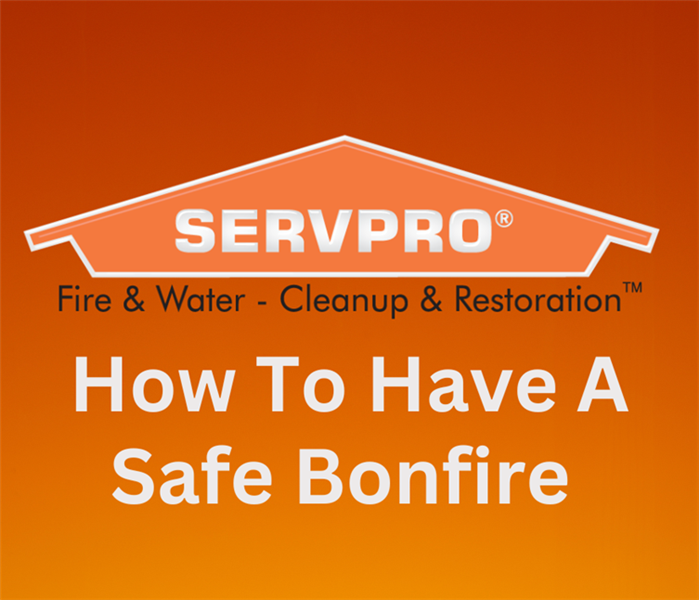 Bonfires can be a fun way to socialize, relax and create memories, but it’s important to keep safety in mind to avoid accidents and injuries.
Bonfires can be a fun way to socialize, relax and create memories, but it’s important to keep safety in mind to avoid accidents and injuries.
Bonfires can be a fun way to socialize, relax and create memories, but it’s important to keep safety in mind to avoid accidents and injuries. Here are some tips on how to have a safe bonfire:
- Choose a safe location: Before starting a bonfire, make sure you have a safe location. Choose a spot away from trees, shrubs, and other flammable objects. Keep at least a 10-foot radius around the fire clear of any objects that could catch fire, and be mindful of any overhanging branches or power lines.
- Check the weather: It’s important to check the weather before starting a bonfire. Avoid lighting a fire in windy conditions, as this can increase the risk of the fire spreading. Also, check for any fire restrictions or bans in your area.
- Use proper fuel: Use only dry, seasoned wood or charcoal to fuel your bonfire. Do not use gasoline, lighter fluid, or other accelerants to start the fire. These can cause flare-ups and are extremely dangerous.
- Supervise children and pets: Children and pets should be supervised at all times around the bonfire. Keep them at a safe distance from the fire and make sure they understand the dangers of playing near the flames.
- Keep a fire extinguisher or water source nearby: In case of an emergency, it’s important to have a fire extinguisher or water source nearby. Keep a bucket of water, hose, or fire extinguisher within reach of the bonfire.
- Never leave a fire unattended: Bonfires should never be left unattended. Always have someone present to monitor the fire and make sure it doesn’t get out of control.
- Properly extinguish the fire: When it’s time to put out the fire, use water to fully extinguish the flames. Make sure all embers and coals are completely extinguished before leaving the fire unattended.
By following these safety tips, you can enjoy a fun and safe bonfire experience with friends and family. Remember, safety should always come first, so take the necessary precautions to prevent accidents and injuries.
SERVPRO Of Natick Milford is The #1 Choice in Cleanup and Restoration for residential and commercial buildings’ fire, mold, water, and storm damage.
We service Bellingham, Foxborough, Franklin, Millis, Norfolk, Wethersfield, and Wrentham, MA
What Causes Microwave Fires?
5/5/2023 (Permalink)
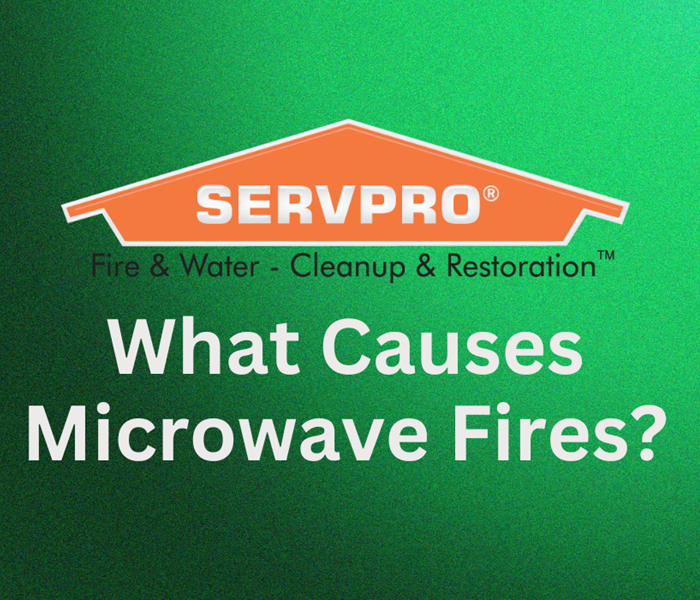 To prevent microwave fires, use only microwave-safe containers, keep your microwave clean, do not overheat food.
To prevent microwave fires, use only microwave-safe containers, keep your microwave clean, do not overheat food.
Microwaves can pose safety hazards if not used correctly. One of the most dangerous risks associated with microwaves is the possibility of a fire.
The leading cause of microwave fires is the use of inappropriate containers or dishes. Microwave-safe containers are designed to withstand the high heat generated by the microwave, while other containers may melt, warp, or even catch fire. Common materials that are not suitable for microwaving include aluminum foil, metal, plastic containers that are not labeled as microwave-safe, and dishes with metallic or gold paint. When using a microwave, it is crucial to ensure that the containers and dishes you use are labeled as microwave-safe.
Another factor that can cause microwave fires is the buildup of grease or food residue inside the appliance. When food particles accumulate on the walls or ceiling of the microwave, they can overheat and catch fire. It is essential to clean your microwave regularly, especially after cooking greasy or fatty foods.
Overheating food can also lead to microwave fires. When food is cooked for too long, or if the microwave's power settings are set too high, the food can overheat and ignite. It is vital to follow the cooking instructions carefully and to stop cooking the food once it has reached the recommended temperature.
Lastly, a faulty or malfunctioning microwave can also cause fires. If your microwave is making unusual noises, sparks, or emits smoke, it is essential to stop using it immediately and have it inspected by a professional. Do not attempt to repair the appliance yourself, as this can be dangerous.
Microwave fires can be dangerous and should be avoided at all costs. To prevent microwave fires, use only microwave-safe containers, keep your microwave clean, do not overheat food, and have any malfunctioning microwave inspected by a professional. By following these safety tips, you can enjoy the convenience of a microwave without putting yourself or your home at risk.
SERVPRO Of Natick Milford is The #1 Choice in Cleanup and Restoration for residential and commercial buildings’ fire, mold, water, and storm damage.
We service Bellingham, Foxborough, Franklin, Millis, Norfolk, Wethersfield, and Wrentham, MA
Do you have a fire safety plan?
4/28/2023 (Permalink)
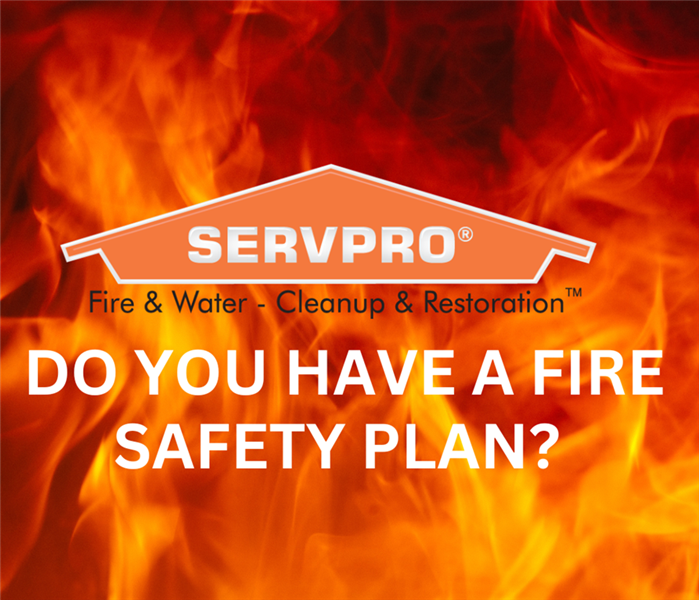 A fire safety plan is essential for keeping you and your loved ones safe during a fire.
A fire safety plan is essential for keeping you and your loved ones safe during a fire.
Fires can happen suddenly and spread quickly, making it important to have a plan in place that everyone knows and can follow.
Why do you need a fire safety plan?
A fire safety plan can help you and your loved ones stay safe during a fire. It can also help prevent injuries and property damage by ensuring that everyone knows what to do in the event of a fire. Having a plan in place can reduce panic and confusion during an emergency and increase the chances of everyone getting out safely.
How to create a fire safety plan
- Draw a floor plan: Start by drawing a floor plan for your home or workplace. Identify all exits, including doors and windows, and ensure they are easily accessible.
- Determine a meeting place: Choose a safe meeting place outside of your home or workplace where everyone can gather after evacuating. This could be a neighbor's house, a street corner, or a nearby park.
- Assign responsibilities: Assign responsibilities to each person in your household or workplace. This could include tasks such as calling 911, grabbing important documents or belongings, or assisting others in evacuating.
- Practice evacuation drills: Regularly practice evacuation drills with everyone in your household or workplace. This will help ensure that everyone knows what to do in the event of a fire and can evacuate safely and quickly.
- Install smoke detectors: Install smoke detectors on every level of your home or workplace and test them regularly to make sure they are working correctly. Replace the batteries at least once a year.
- Know how to use a fire extinguisher: Make sure that everyone in your household or workplace knows how to use a fire extinguisher and where it is located.
- Review and update the plan: Regularly review and update your fire safety plan to ensure that it is still relevant and effective. Make changes as necessary, such as adding new exits or changing responsibilities.
A fire safety plan is essential for keeping you and your loved ones safe during a fire. By creating a plan and regularly practicing evacuation drills, you can increase your chances of getting out safely and prevent injuries and property damage.
We service Blackstone, Hopedale, Mendon, Milford, Natick, North Natick, and South Natick MA.
SERVPRO Of Natick Milford is The #1 Choice in Cleanup and Restoration for residential and commercial buildings’ fire, mold, water, and storm damage.
Bonfire safety tips
4/26/2023 (Permalink)
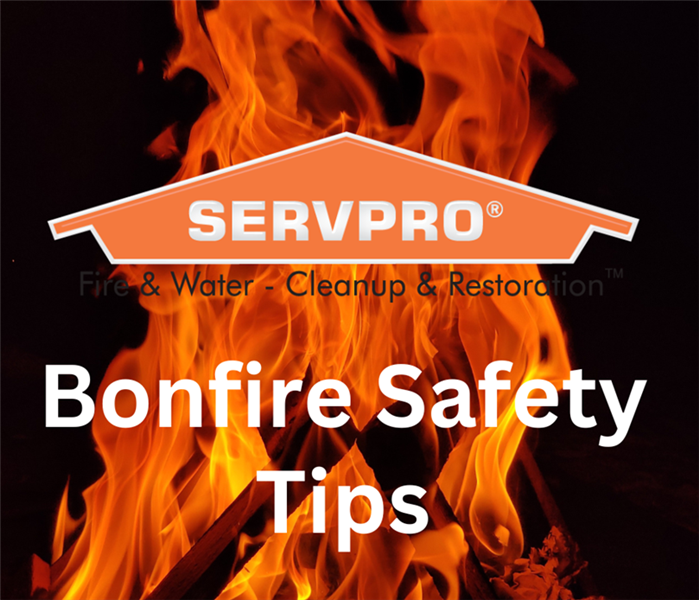 Bonfires can be a fun activity, but it's important to prioritize safety to prevent accidents or injuries.
Bonfires can be a fun activity, but it's important to prioritize safety to prevent accidents or injuries.
Bonfires are a popular outdoor activity. A bonfire can quickly turn into a dangerous situation if proper safety measures are not taken.
Here are bonfire safety tips to keep you and your loved ones safe:
- Choose the right location: When selecting the location for your bonfire, make sure to choose an area that is at least 25 feet away from any structures or combustible materials. This includes buildings, trees, bushes, and anything else that can easily catch fire. Also, ensure that the area is flat and level to prevent the fire from spreading.
- Clear the area around the bonfire: Before lighting the fire, clear the area around the bonfire of any debris, such as dry leaves, sticks, or branches. This will prevent sparks from igniting any nearby materials.
- Use an appropriate container: When building a bonfire, use a container that is made of metal or brick. This will prevent the fire from spreading beyond the container. Never use a container made of plastic, as it can melt and cause the fire to spread.
- Keep water or a fire extinguisher nearby: In case of an emergency, make sure to have a bucket of water or a fire extinguisher nearby. This will help you quickly extinguish the fire if it gets out of control.
- Don't use accelerants: Never use accelerants, such as gasoline or lighter fluid, to start a bonfire. This can cause an explosion or a sudden flare-up, which can be dangerous.
- Attend to the fire at all times: Never leave a bonfire unattended, especially if there are children or pets around. Assign a responsible person to monitor the fire at all times and make sure that it remains under control.
- Extinguish the fire properly: When you're done with the bonfire, make sure to extinguish the fire completely. Pour water over the fire and stir the ashes to ensure that there are no hot spots that could reignite the fire.
Bonfires can be a fun activity, but it's important to prioritize safety to prevent accidents or injuries.
We service Blackstone, Hopedale, Mendon, Milford, Natick, North Natick, and South Natick MA.
SERVPRO Of Natick Milford is The #1 Choice in Cleanup and Restoration for residential and commercial buildings’ fire, mold, water, and storm damage.
Grill Fire Safety Tips
4/24/2023 (Permalink)
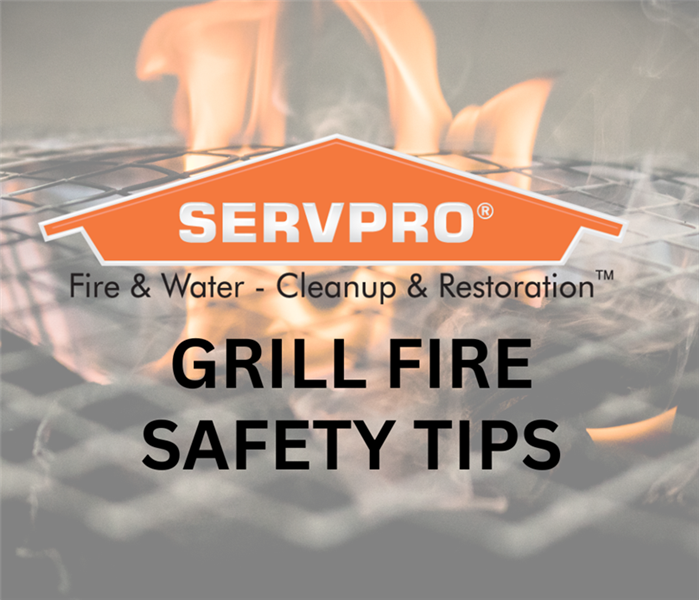 Grilling can be an enjoyable activity, but it's important to prioritize safety to prevent a grill fire.
Grilling can be an enjoyable activity, but it's important to prioritize safety to prevent a grill fire.
Whether you're cooking burgers, chicken, or vegetables, it's important to prioritize safety when using a grill. A grill fire can happen quickly and without warning, but there are steps you can take to prevent them from occurring.
- Choose the right location for your grill: When choosing where to place your grill, ensure that it is at least 10 feet away from your home or any other combustible structures. Keep it away from overhanging branches, deck railings, and other potentially flammable objects.
- Clean your grill regularly: Cleaning your grill regularly can prevent grease buildup and reduce the risk of flare-ups. Grease fires can happen when grease and fat accumulate on the grates and drip pans. Make sure to clean your grill after every use, and occasionally deep clean it with a grill brush.
- Check for gas leaks: If you have a gas grill, make sure to check the hoses and connections for leaks before every use. A gas leak can cause an explosion or fire, so it's important to be vigilant.
- Keep a fire extinguisher nearby: In case of a fire, make sure to have a fire extinguisher nearby. Ensure that you know how to use it before you need it.
- Be mindful of what you're cooking: Some foods, like fatty meats or foods marinated in oil, are more likely to cause flare-ups. Be mindful of what you're cooking and how you're cooking it. Keep a close eye on the grill, and use a spray bottle of water to douse any small flames.
- Never leave the grill unattended: Never leave the grill unattended, especially if you have children or pets in the area. Accidents can happen quickly, and it's important to be present to address any issues that may arise.
- Shut off the grill properly: After you're finished cooking, make sure to shut off the grill properly. Turn off the burners and close the gas valve if you have a gas grill. For a charcoal grill, spread the coals out and let them cool down completely before disposing of them in a metal container.
Grilling can be an enjoyable activity, but it's important to prioritize safety to prevent a grill fire.
We service Blackstone, Hopedale, Mendon, Milford, Natick, North Natick, and South Natick MA.
SERVPRO Of Natick Milford is The #1 Choice in Cleanup and Restoration for residential and commercial buildings’ fire, mold, water, and storm damage.
What should you do after a fire?
4/18/2023 (Permalink)
 A fire can be a traumatic and devastating event, and the aftermath can be overwhelming.
A fire can be a traumatic and devastating event, and the aftermath can be overwhelming.
A fire can be a traumatic and devastating event, and the aftermath can be overwhelming.
Here are some steps you should take after a fire:
- Contact your insurance company: One of the first things you should do after a fire is to contact your insurance company. They can help you start the claims process and provide guidance on what steps to take next.
- Assess the damage: Once it is safe to do so, assess the damage to your home. Look for any visible damage, including structural damage, water damage, and smoke damage. Take photos of the damage to provide to your insurance company.
- Secure your property: If your home is severely damaged, you may need to board up windows and doors or cover damaged areas to prevent further damage from weather or vandalism.
- Contact restoration professionals: A professional restoration company can help you with the cleanup, salvage, and restoration of your home and belongings. They can also help you assess the extent of the damage and provide guidance on the best course of action.
- Salvage what you can: If it is safe to do so, try to salvage any belongings that were not damaged by the fire. You may be able to save some items with proper cleaning and restoration.
- Address smoke damage: Smoke can cause extensive damage to a home, even in areas not directly affected by the fire. Be sure to address smoke damage to prevent health hazards and further damage to your home.
- Ensure safety: Before returning to your home, ensure that it is safe to do so. Check for gas leaks, electrical hazards, and other safety concerns.
By contacting your insurance company, assessing the damage, securing your property, contacting restoration professionals, salvaging what you can, addressing smoke damage, and ensuring safety, you can begin to rebuild and move forward after a fire.
We service Blackstone, Hopedale, Mendon, Milford, Natick, North Natick, and South Natick MA.
SERVPRO Of Natick Milford is The #1 Choice in Cleanup and Restoration for residential and commercial buildings’ fire, mold, water, and storm damage.
What Are The Causes Of Fire?
2/15/2023 (Permalink)
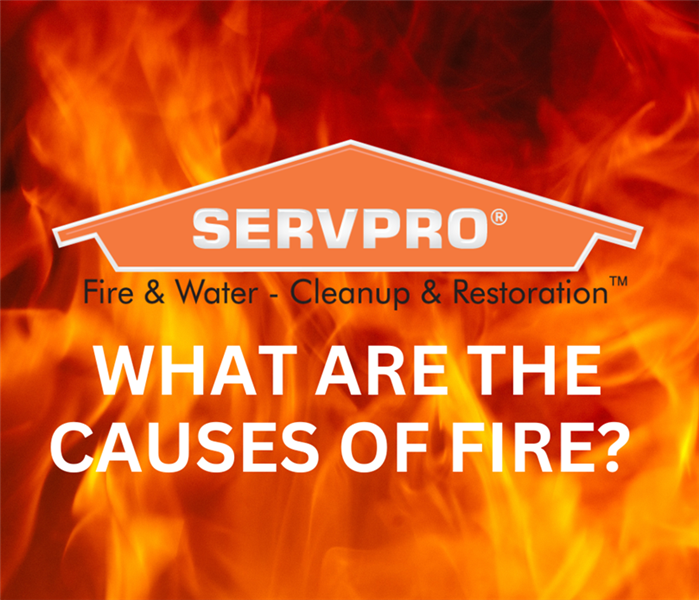 Fires can happen at any time, and they can be devastating in terms of the damage they can cause to property, natural habitats, and human lives.
Fires can happen at any time, and they can be devastating in terms of the damage they can cause to property, natural habitats, and human lives.
Fires are natural disaster that can occur in many different forms. They can happen at any time, and they can be devastating in terms of the damage they can cause to property, natural habitats, and human lives.
Causes of Fires
Fires can be caused by a wide range of factors, including natural causes such as lightning strikes, as well as human activities such as campfires, cooking, and smoking. In some cases, fires can also be caused by electrical faults or mechanical failures, such as faulty wiring or overheated equipment. In recent years, climate change has been identified as a major contributor to the increased incidence and severity of fires, as rising temperatures and changing weather patterns have created more favorable conditions for fires to occur.
Impacts of Fires
The impacts of fires can be far-reaching and long-lasting, affecting everything from the immediate safety of people and animals to the long-term health of ecosystems. In the short term, fires can cause injury and death to people and animals, as well as damage to property and infrastructure. In the long term, fires can have significant impacts on natural habitats, including loss of vegetation, changes in soil composition, and loss of biodiversity. Fires can also have a significant impact on the climate, releasing large amounts of carbon dioxide and other greenhouse gases into the atmosphere.
Prevention of Fires
Preventing fires requires a multi-faceted approach, including education, awareness, and proactive measures. This includes educating people about the risks and causes of fires, as well as providing information on how to prevent them. Some of the key preventative measures include regular maintenance of electrical equipment, avoiding open fires in high-risk areas, and ensuring that campfires are extinguished completely before leaving the site. Other important steps include monitoring weather conditions and fire danger ratings, as well as being prepared to evacuate in the event of an emergency.
While fires can be difficult to prevent, there are many steps that can be taken to reduce the risk of fires and mitigate their impacts.
SERVPRO of Natick Milford is your premier choice for fire damage and restoration. Our teams are ready to respond 24 hours a week, any day of the year. When you bring us on the job our team of licensed contractors and certified technicians will work collaboratively with you throughout the duration of the project. They will keep you updated on the project's status and ensure that your expectations are met. We will help you to move forward and make it “Like it never even happened” for all of your fire damage.
SERVPRO of Natick Milford: How to Deal with Fire in the Workplace: Tips and Strategies
2/5/2023 (Permalink)
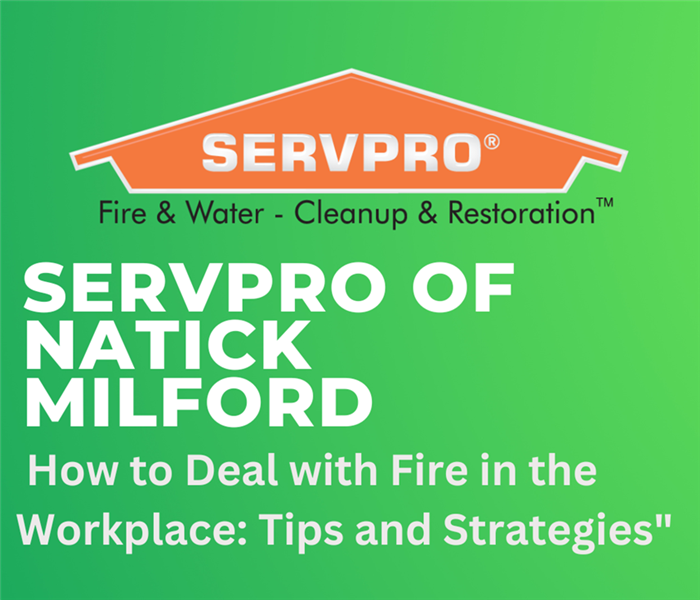 Being prepared and knowing the proper procedures to follow can help you effectively deal with a fire and get back to business as soon as possible.
Being prepared and knowing the proper procedures to follow can help you effectively deal with a fire and get back to business as soon as possible.
Having a fire response plan in place and understanding the proper procedures to follow can help prevent damage, minimize injury and ensure the safety of everyone in the workplace.
Here are some tips and strategies to help you deal with fire in your business:
- Establish a fire response plan: This should include the proper procedures to follow in case of a fire, such as evacuation procedures, and the designated meeting place for employees after evacuation.
- Install fire alarms and fire suppression systems: Fire alarms should be placed throughout the workplace, and fire suppression systems such as sprinklers should be installed to help put out the fire.
- Regularly inspect and maintain fire equipment: Regular inspections and maintenance of fire alarms, fire suppression systems and other fire equipment is essential to ensure they are functioning properly and can be used in the event of a fire.
- Conduct regular fire drills: Regular fire drills are important to help employees understand what to do in the event of a fire, and to ensure that everyone is prepared.
- Store flammable materials properly: Flammable materials should be stored in fireproof cabinets, away from heat sources and potential sources of ignition.
- Train employees: Employees should be trained on the proper procedures to follow in case of a fire, including how to evacuate the building, how to use fire extinguishers, and how to report the fire.
- Have an emergency evacuation plan: An emergency evacuation plan should be in place and clearly communicated to all employees. This should include the designated meeting place for employees after evacuation.
Being prepared and knowing the proper procedures to follow can help you effectively deal with a fire and get back to business as soon as possible.
SERVPRO of Natick Milford is your premier choice for fire damage and restoration. Our teams are ready to respond 24 hours a week, any day of the year. When you bring us on the job our team of licensed contractors and certified technicians will work collaboratively with you throughout the duration of the project. They will keep you updated on the project's status and ensure that your expectations are met. We will help you to move forward and make it “Like it never even happened” for all of your fire damage.
SERVPRO of Natick Milford Shares The Most Frequently Asked Questions About Fire Damage and Restoration
1/7/2023 (Permalink)
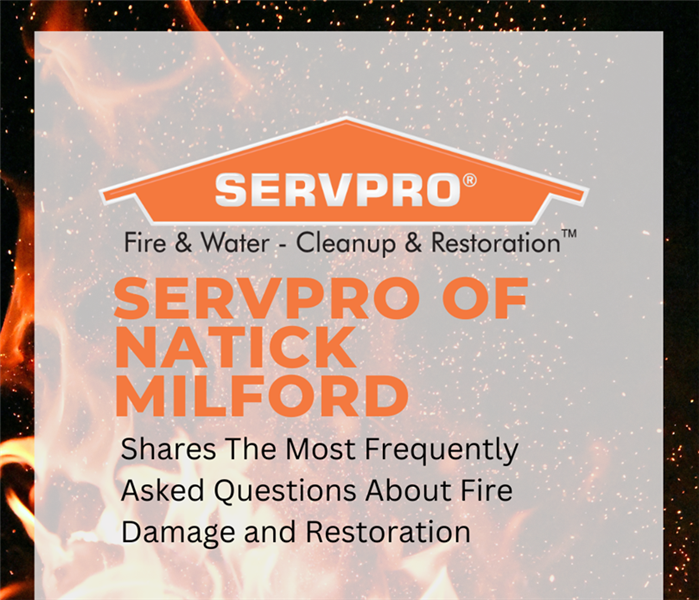 Surviving a fire can be a traumatic and challenge. Here are the top questions when it comes to fire damage.
Surviving a fire can be a traumatic and challenge. Here are the top questions when it comes to fire damage.
Surviving a fire can be a traumatic and challenge. Here are the top questions when it comes to fire damage.
- What Is the First Thing I Should Do After a Fire?: After the firefighters have put out the flames, it is a wise decision to call a fire damage restoration company immediately to begin the repairs.
- Can I Inspect My Home After a Fire?: No, you will want stay out of your property following a fire. Homes affected by a blaze are considered unstable and unsafe.
- How Do I Secure My Home After a Fire?: The damage restoration company can install board-ups and tarp covers to protect your home.
- If the Fire Damage Is Minor, Can I Clean It Myself?: No, this can put you and your loved ones in danger. Exposure to smoke and soot from fires can cause breathing difficulties.
- What Should I Do With the Water Used To Extinguish the Fire?: The fire damage repair team can extract the standing water using equipment such as sumps or extraction tools.
- Can Smoke Damage Be Removed? Smoke and soot damage on floors, walls, ceilings, and other surfaces might be tough to deal with, but they can be removed.
- Do I Need To Move Out During the Restoration Process? Yes, living in a fire-damaged home can be more stressful and unsafe.
- How Long Does Fire Damage Restoration Take?: The timeline for fire damage restoration project varies depending on the scope and severity of the damage.
SERVPRO of Natick Milford is your premier choice for fire damage and restoration. Our teams are ready to respond 24 hours a week, any day of the year. When you bring us on the job our team of licensed contractors and certified technicians will work collaboratively with you throughout the duration of the project. They will keep you updated on the project's status and ensure that your expectations are met. We will help you to move forward and make it “Like it never even happened” for all of your fire damage.
SERVPRO of Natick Milford Holiday Safety Advice
12/5/2022 (Permalink)
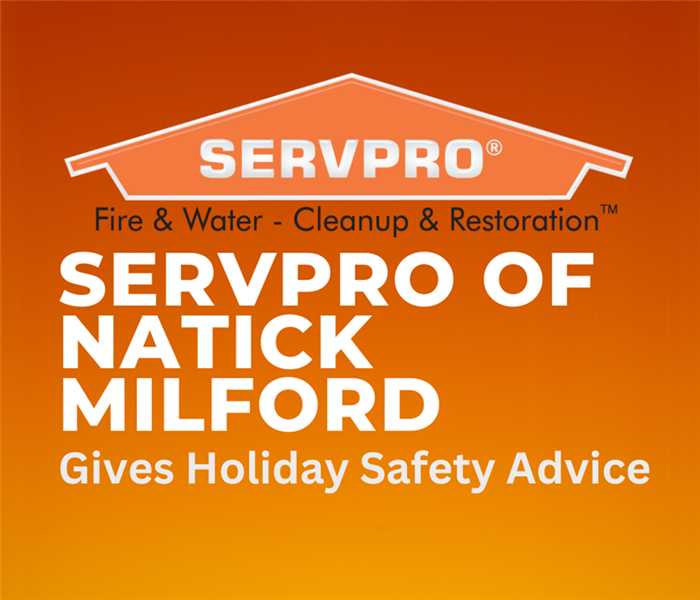 With proper preparation and safe practices, you can avoid those dangerous situations while decorating.
With proper preparation and safe practices, you can avoid those dangerous situations while decorating.
It is everyone’s favorite time of the year! With Christmas, there can be more fires than normal. Decorations can have a risk and electrocution. With proper preparation and safe practices, you can avoid those dangerous situations while decorating.
- A missing or broken bulb can lead to shocks or even fires.
- Replace any broken bulbs before you string up your home or tree.
- If you decorate your home's exterior, make sure to use a ladder that isn’t metal.
- Make sure to use lights that are labeled indoors for your indoor lights and ones labeled outdoors for your outdoor lights.
- Check to make sure your lights are labeled as waterproof, especially outdoors.
- Always use an extension cord that is rated for outdoor use.
- Keep your cords from sitting on the ground.
- Make sure your light cord and your extension cord stay out of puddles or snow.
- Keep your light strands off the ground.
- Don't make your lights a year-long attraction. Lights, including smart lights, should not be used for long terms.
- Leave cords out of doors and windows. The cord could become pinched. This can ruin the insulation around the wires and lead to a shock.
Should you experience a fire, call 911 immediately and call your local fire restoration company.
SERVPRO of Natick Milford is your premier choice for fire damage and restoration. Our teams are ready to respond 24 hours a week, any day of the year. When you bring us on the job our team of licensed contractors and certified technicians will work collaboratively with you throughout the duration of the project. They will keep you updated on the project's status and ensure that your expectations are met. We will help you to move forward and make it “Like it never even happened” for all of your fire damages.
Spring Fire Safety Tips in Natick Milford
3/4/2022 (Permalink)
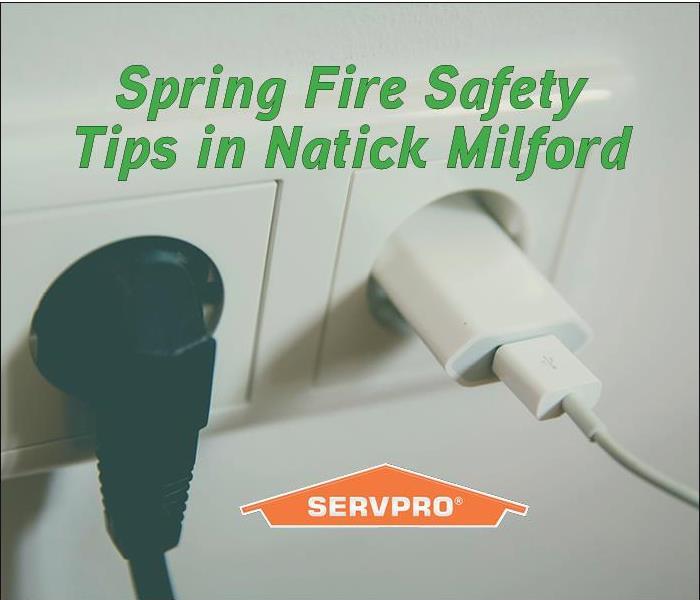 Fires can happen at any time anywhere, unfortunately. It can cause a lot of damage and stress that no one can ever fully be prepared for.
Fires can happen at any time anywhere, unfortunately. It can cause a lot of damage and stress that no one can ever fully be prepared for.
Fires can happen at any time anywhere, unfortunately. It can cause a lot of damage and stress that no one can ever fully be prepared for.
There isn’t one way to prevent a fire, but there are several precaution tips that you can take.
Inside the home:
- Check your smoke and carbon monoxide detectors.
- Check your fire extinguishers.
- Check for damaged extension cords.
- Check and clean filters above the stove.
Prepare for storm-related outages:
- Make sure your flashlights and portable radios have batteries.
- Practice exit drills with your family
- Pull the refrigerator out and vacuum or dust the coils.
Outside and around the yard:
- Make sure your address numbers are visible.
- Clean up yard debris.
- Maintain a clear 'fire zone' of 10 feet around structures.
- Check outdoor electrical outlets.
- Get your BBQ grill cleaned.
- Check all propane tanks and lines for leaks.
- Keep 100 feet of garden hose with an attached nozzle
We hope that you are never faced with fire damage in your home or office. These are some great tips for you to help ensure you are doing your part.
SERVPRO Natick Milford is available 24/7 including holidays and weekends to assist you and help you with residential or commercial water damage. “Like it never even happened.”
SERVPRO of Natick, Milford Talks About Fire Damage
2/10/2022 (Permalink)
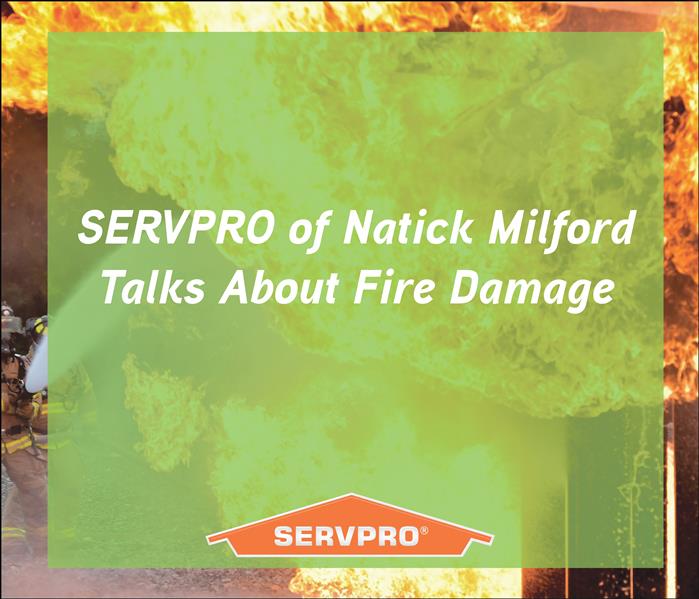 Our homes have more electricity than ever before. If things are not running properly easily, a fire can break out.
Our homes have more electricity than ever before. If things are not running properly easily, a fire can break out.
Electricity is essential and we rarely think twice about it. Our homes have more electricity than ever before. If things are not running properly easily, a fire can break out. Here are some tips to help prevent a fire:
- Check electrical outlets for loose-fitting plugs or exposed wires.
- Don’t force plugs into outlets
- Do not overload outlets with adapters.
- Make sure cords are not frayed or cracked.
- Extension cords are designed for temporary use only.
- Light bulbs should be the correct wattage for the fixture’s design.
- Make sure light bulbs are screwed in tightly.
- Install Ground Fault Circuit Interrupters anywhere water could be.
Fires are horrible disasters, it is important to know how to prevent one whenever possible. Sometimes you can't completely prevent them, but these tips can help!
SERVPRO of Natick, Milford is available 24/7 including holidays and weekends to assist you and help you with your fire damage. “Like it never even happened.”
SERVPRO of Natick, Milford Shares The Top Reasons For Fires
2/10/2022 (Permalink)
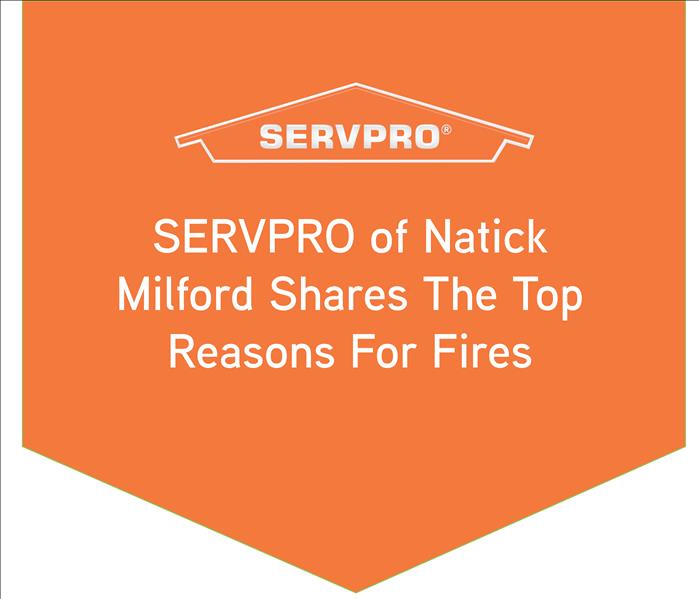 Fires can happen and there are still important factors to understand. The key to fire prevention is knowing the most common causes.
Fires can happen and there are still important factors to understand. The key to fire prevention is knowing the most common causes.
Fires can happen and there are still important factors to understand. The key to fire prevention is knowing the most common causes, so you can help prevent it as best as you can.
Here are the top causes of fires:
- Never leave a stove unattended.
- Make sure to keep a fire extinguisher nearby.
- Parents should make sure that young children don’t have access to matches and flammable liquids.
- An unattended burning cigarette on a carpet can ignite a serious fire.
- Space heaters are extremely flammable; keep them away from the furniture.
- A power cord can have your home in flames in a short amount of time.
- Always ensure all candles are blown out before leaving the room.
- Unattended fires are the main cause of fireplace-centered house fires.
- Dryers are loaded with debris which can lead to fires. Remove the lint screen after every use.
SERVPRO of Natick, Milford is available 24/7 including holidays and weekends to assist you and help you with your fire damage. “Like it never even happened.”
SERVPRO of Natick, Milford Shares Fire Extinguisher Use And Safety
2/10/2022 (Permalink)
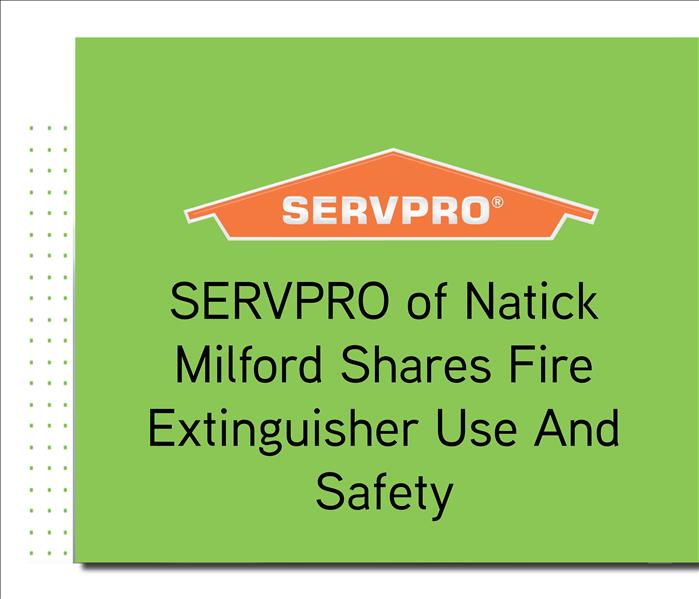 A portable fire extinguisher can be a saving tool should a fire arise. Here are some quick tips on how to use a fire extinguisher correctly.
A portable fire extinguisher can be a saving tool should a fire arise. Here are some quick tips on how to use a fire extinguisher correctly.
A portable fire extinguisher can be a saving tool should a fire arise. Here are some quick tips on how to use a fire extinguisher correctly.
Pull the pin, pointing away from you, and release the locking mechanism. Aim low, and then point at the base of the fire. Squeeze the lever slowly and evenly. Lastly, sweep from side to side.
Make sure to read the instructions on the fire extinguisher. You will want to become familiar with it before a fire breaks out. It is important to encourage family members and coworkers to become how to use a fire extinguisher.
Remember, extinguishers do have their limitations! Make sure you have the correct type of extinguisher for your home or facility.
SERVPRO of Natick, Milford is available 24/7 including holidays and weekends to assist you and help you with fire damage. “Like it never even happened.”
SERVPRO Natick Milford Helps With Fire Safety
2/3/2022 (Permalink)
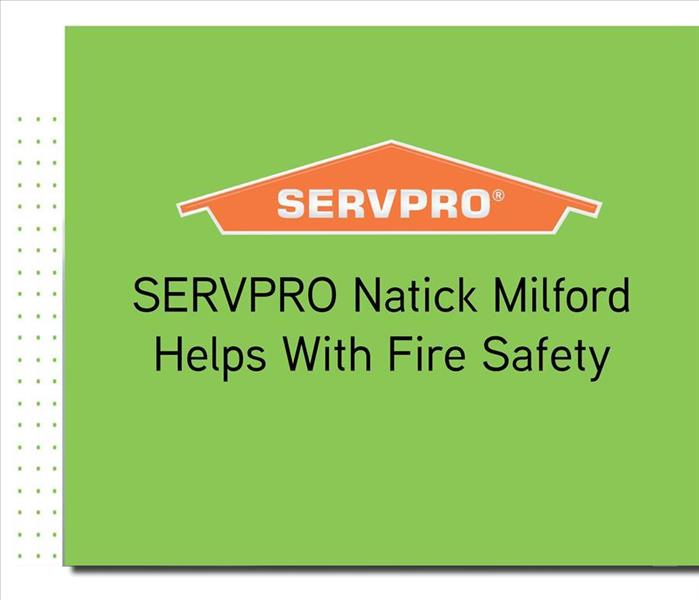 If you follow the proper safety precautions, your space heater will be safe to operate
If you follow the proper safety precautions, your space heater will be safe to operate
The cold winter months are here, and it is time to turn on the heaters. Space heaters are high-wattage items. They have the potential to create fires and set curtains and clothing on fire.
If you follow the proper safety precautions, your space heater will be safe to operate:
DO:
- Your space heater should be listed by a qualified testing laboratory, you can find this on the label of the heater.
- Look for the space heaters that have sensors with them. They will turn off when they overheat or if it tips over.
- Ensure that your carbon monoxide detector is tested monthly.
- If you think that there is damage to the cord or plug, do not run your space heater.
- Unplug your heater when you are not using it.
DON’T:
- Your space heater should not be left in kitchens or bathrooms, where water is being used regularly.
- Keep your space heater near flammable objects such as curtains, papers, furniture, pillows, and bedding.
- Do not leave your space heater on while you are sleeping.
SERVPRO Natick Milford is available 24/7 including holidays and weekends to assist you and help you with your firestorm damage. “Like it never even happened.”
SERVPRO of Natick, Milford Share Tips To Get Fire Smell Out Of Your House.
1/31/2022 (Permalink)
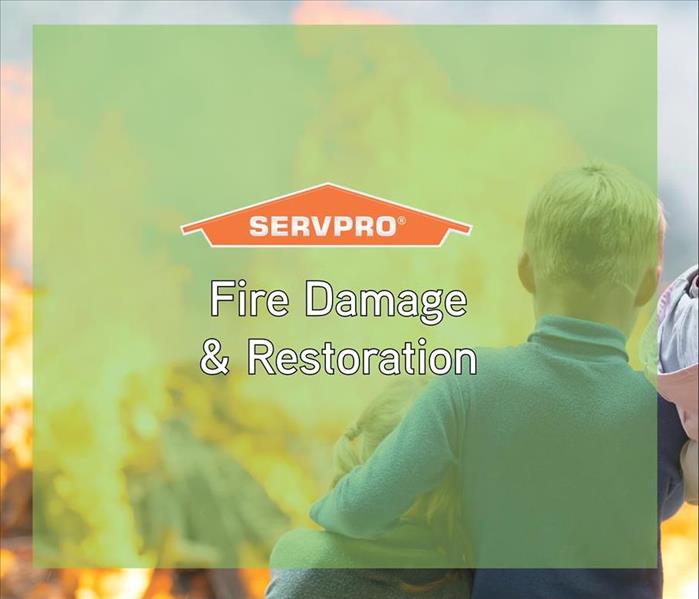 Having a fire in your home can affect you in many ways especially long-term. The smell of smoke may still be present if you had a fire recently.
Having a fire in your home can affect you in many ways especially long-term. The smell of smoke may still be present if you had a fire recently.
Having a fire in your home can affect you in many ways especially long-term. The smell of smoke may still be present if you had a fire recently. The good news is that this is easily fixable!
Here are tips to get that smell out of your house:
Air out the house. Open every window in your house for about 20 minutes. You might also want to place the fans throughout your house.
Clean Aggressively. Make sure to wash all clothes, towels, bedsheets, curtains, rugs, blankets, and other materials in your home. You might want to also was all solid surfaces with dish soap, white vinegar, and warm water to get rid of the odor.
Deep clean the carpet. To eliminate smoke odors from the carpet you must clean and deodorize it. This cleaning involves vacuuming the fabric followed by washing the material with an appropriate solution and then disinfecting it with vinegar or baking soda.
Clean out the HVAC system. Smoke can stay stuck in the ductwork in your home, consider hiring a professional or look for a DIY solution online to eliminate this smell.
SERVPRO of Natick, Milford is available 24/7 including holidays and weekends to assist you and help you with residential or commercial water damage. “Like it never even happened.”
How To Remove Dryer Lint From the Exhaust Hose
1/29/2022 (Permalink)
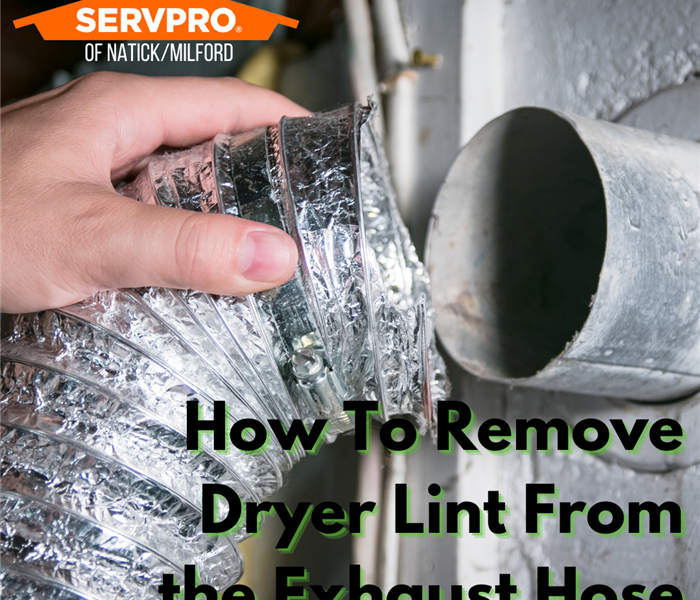 Cleaning Out Your Exhaust Hose Can Prevent Fires
Cleaning Out Your Exhaust Hose Can Prevent Fires
Clothes dryers require some maintenance to not only stay fully functioning for as long as possible but also to ensure your own safety, as an accumulation of lint can cause a lint fire. To prevent this from happening in Natick, MA, there are a couple of simple things you can do to keep your dryer running properly.
Clean the Lint Screen
Each time you use the dryer, it is best to clean the lint from the lint screen, which is found either inside the dryer or somewhere easily accessible on the outside. Gently pull it out and wipe the lint off with your hand, brush, or a vacuum hose. Leaving lint to gather over a long period of time could cause a dryer fire.
If you use dryer sheets, wash the lint screen with soap and water every few weeks. Dryer sheets can leave a residue behind and may increase fire damage. You can also take a vacuum hose and vacuum out the area where the lint screen is held, to clean out any lint that has been left behind.
Clean the Vents and Exhaust Hose
If your dryer has been leaving your clothing damp after a full drying cycle, this is a good time to check for lint accumulation in other places and clean out the other vents to avoid a lint fire.
Unplug the Dryer
Remove the exhaust hose from the wall. There will probably be a circular clamp around it that can be removed by squeezing, or there will be a bolt that is easily loosened with a screwdriver. If you have a gas-powered dryer, it’s a good idea to call a professional because moving the machine may cause a gas leak.
Clean out the exhaust hose with a cleaning rod or vacuum
Check the vent outside your home by taking off the screen outside and vacuuming or brushing out accumulated lint. Then put the screen back in place.
If this does not solve your drying problem, you can also take the panel off the back of the dryer and vacuum or dust off all visible parts. Once this is done and the dryer is put back together, plug it in and do a quick cycle to ensure everything is functioning correctly. Making these things part of your regular cleaning routine is the best way to keep your home safe from a lint fire and ensure your dryer works well for as long as possible.
SERVPRO Natick Milford Shares Fire Safety
1/17/2022 (Permalink)
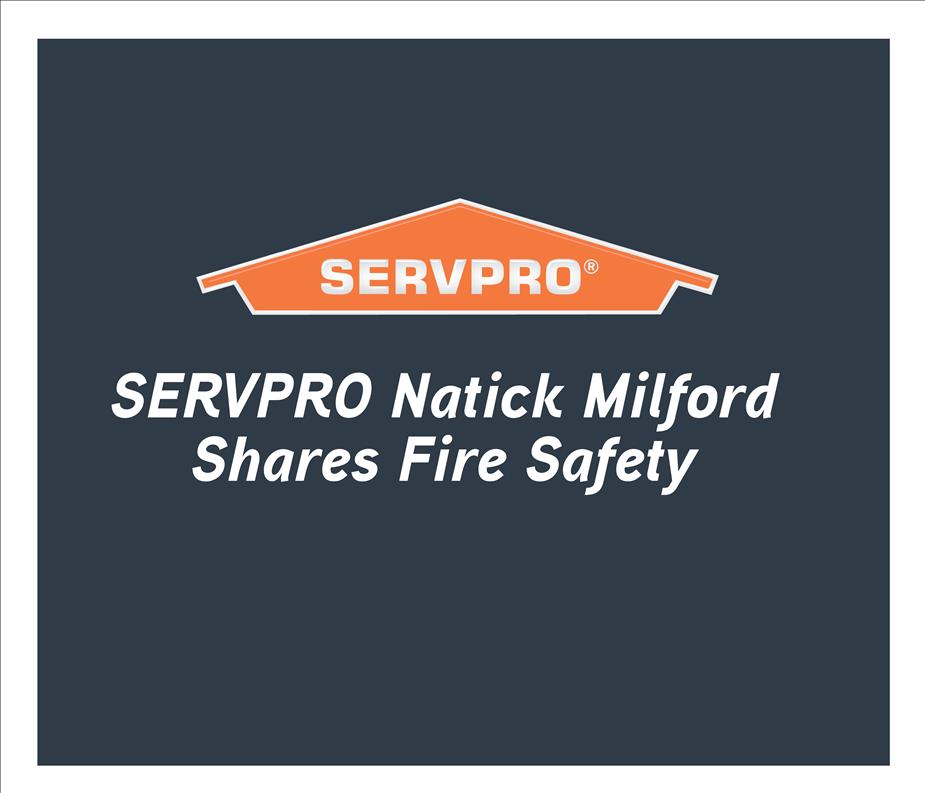 Most electrical fires in homes are sparked off by incorrectly installed wiring or overloaded circuits.
Most electrical fires in homes are sparked off by incorrectly installed wiring or overloaded circuits.
The winter months are a popular time for fires. What Causes Electrical Fires?
Most electrical fires in homes are sparked off by incorrectly installed wiring or overloaded circuits. There are many things you can do at home to prevent fires.
- New Appliance Setup: If you are setting up a new appliance by yourself, you should double-check all your connections, and read the manual completely.
- Extension Cords: These are the most common causes of electrical fires and can be easily preventable. Make sure the capacity of the extension cord matches the appliance; the total wattage of all devices connected should never exceed the extension cord capacity.
- Light Bulbs: Some fixtures may have specific bulbs. To prevent an electrical fire, make sure that your light bulbs are used with electrical sockets.
- Power Cords: These have at least six outlets in the device with one main cord that plugs into a wall outlet. Never have one power strip into another; this can start a fire and affect your circuit breakers.
SERVPRO Natick Milford is available 24/7 including holidays and weekends to assist you and help you with residential or commercial fire damage. “Like it never even happened.”
5 Types Of Fires
3/3/2021 (Permalink)
Fires are categorized into 5 different classes, and each class has different elements that make it unique. That is why it it critical to call certified fire remediation experts when your commercial or residential property suffers fire damage.
Class A
Class A fires are defined as ordinary combustibles. These types of fires use common flammable material as their fuel source such as food, fabric, paper, trash. This class of fire is essentially the most common type of fire damage. Class A fires are commonly put out with water or monoammonium phosphate.
Class B
Class B fires are fueled by flammable liquids, such as gasoline, petroleum greases, tars, oils, oil-based paints, solvents, and alcohols. These fires also include flammable gases such as propane and butane. Class B fires do not include fires involving cooking oils and grease.
Class C
A Class C fire is one in which an energized electrical element is the cause of the fire. “Energized” means that the electrical component is connected to a power source. Class C fires may be started from faulty wiring, a short circuit, damage to power cords, overloaded electrical outlets, or overheated/overcharged devices.
Class D
Class D fires are characterized by the presence of burning metals. However, not all metals are flammable. Sodium, potassium, uranium, lithium, plutonium, calcium, magnesium, and titanium are all examples of combustible metals. The most common type of Class D fires involve magnesium and titanium.
Class K
A Class K fire is defined as a cooking fire involving combustion from liquids used in food preparation. Technically a type of liquid fire, Class K fires are distinct enough to warrant their own classification. Cooking fires are fueled by a wide range of liquid cooking materials. Greases, cooking oils, vegetable fat, and animal fat are all fuel sources found in Class K.
Each class of fire damage requires specific remediation tools and techniques. No matter what type of fire you experience, SERVPRO of Natick/Milford is here to help! Our Disaster Remediation Teams have been expertly trained to restore the damage done to your home or business. Call us today to (774) 290-4300 and we will make it, "Like it never even happened."
Our Game Plan For Fire Remediation
2/25/2021 (Permalink)
When a devastating fire occurs in your Medfield, MA commercial or residential property, it is hard to think ahead to the recovery process. You may not even know where to begin moving forward. Once the signs of a fire are cleared away, you may still smell the smoke over the long term. Every fire is inherently different, but the certified professionals at SERVPRO of Natick/Milford can help you get to the bottom of the issue through a standard fire procedure.
The Beginning
Once emergency services (if required) extinguish the fire, SERVPRO of Natick/Milford can come in and begin the remediation process. After the smoke clears and the dust settles, our Disaster Remediation Teams of specialists will move in. Depending on the type of damage presented from the fire, the technician will follow a proven game plan.
Our technicians will carefully inspect the surrounding area and test the damaged sections to determine the extend of any structural damage. They always apply a restore before replace approach, ensuring that they will avoid anything that might exacerbate the damage. While they're inspecting and testing, they will walk you through the process and share the game plan.
Executing The Plan
Depending on the severity of the fire damage, our technician will ensure the security of your property. If necessary, they will board up missing walls and windows, and if necessary set tarps to maintain your privacy and prevent the outdoor elements from gaining entry.
Many people don't realize that water damage appears almost at the same time as smoke damage. To rid the situation of water, our technicians use a combination of extractors and dehumidifiers.
After water and moisture remediation is complete our Disaster Remediation Technicians will focus on odor removal. To avoid agitating troublesome particles within the damage area, the technician will remove smoke and soot damage with extreme care. They will take restorable items into account and odors will be fought with using fogging equipment and air scrubbers.
The Final Step
Once all of the major fire damage issues have been taken care of, in addition to the water damage and smoke and soot Our in-house Rebuild Team will begin the necessary repairs to the structure of your property. Since we are a licensed contractor with the State of Massachusetts, we can handle any building services that may be needed from replacing drywall and painting over a refurbished surface!
A fire can strike your Medfield, MA commercial or residential property at any time. When it does we are here to help! Call the experts at SERVPRO of Natick/Milford at (774) 290-4300. We will make it, "Like it never even happened."
Experts In Smoke Damage
2/18/2021 (Permalink)
Fire damage is can cause multiple issues because there are many variables associated with fires. The temperature of the blaze, the extinguishing method used (water and/or agents), structural damage. Water and smoke damage can easily penetrate any crack and crevice on your property. Proper cleaning, immediate neutralizing efforts, proper ventilation, and consistent debris removal efforts are critical to saving as much of the structure and its contents as possible. Timing is the most crucial component of successful remediation project.Not only are the Disaster Remediation Teams at SERVPRO of Natick/Milford faster to any size disaster but their training allows them to assess the damage, plan a course of action, and execute the plan expeditiously.
Timing Is Everything
The IICRC, a global leader in all types of remediation, identifies these time windows:
- Within minutes: Porous materials and synthetics must be immediately addressed to prevent permanent discoloration.
- Within hours to days: wooden furniture, flooring, painted walls, and clothing can become permanently stained. Metal surfaces will begin to rust, pit, and corrode which often requires refinishing or replacement.
- Within weeks: Prolonged soot exposure will embed itself in the fibers and surfaces resulting in a longer, more pricey restoration with a higher likelihood of replacement.
Fires can strike at any time. When they do call the experts at SERVPRO of Natick/Milford at (774) 290-4300. We will make it, "Like it never even happened."
Cleaning Up After A Fire
2/12/2021 (Permalink)
When fire strikes your Natick, Ma commercial or residential property the aftermath can be devastating. From structural and water damage to smoke and soot damage, recovering from a fire is not something most property owners can do alone. Luckily, they do not have to! SERVPRO of Natick/Milford is here to help.
Full Service Fire Remediation
Fire results in incredibly toxic and corrosive soot and is extremely challenging to remove soiling and the highly pungent odors. Our Disaster Remediation Technicians are have received comprehensive training and certification and our Rebuild Teams are staffed with skilled craftsmen. They work hand-in-hand to offer our customers a seamless transition from remediation to rebuild.
Our first step to recovery is containment of the damaged area. It is essential that we prevent the drifting and wafting of smoke and soot. If they are not contained, airborne particles of smoke and soot will quickly travel to every inch of surface area in your property. We use polyethylene barriers to seal the perimeter of the affected. Our HEPA filters force contaminants through and vent their air to the outdoors, ensure that your air quality returns to normal levels.
Three types of soot result from fires: dry and ashy, thick and wet, and protein-based. Our expert technicians are trained in each specific method of removal for the various types of soot. If not taken care of properly, the efforts to clean soot can instead cause smearing or staining.
By using thermal fogging, ozone machines, or hydroxyl generators for odor removal, we can remove the tiny particles of soot that hide in crevices and even in HVAC systems.
During the remediation process our technicians will be documenting the damage and sharing that information with our Rebuild Team. This gives them the necessary insight to plan the rebuild process prior while the remediation is ongoing which intern enables them to hit the ground running as soon as the remediation process is complete thereby eliminating any lag time. Furthermore, in some instances, our Rebuild Teams are able to begin their work prior the completion of the remediation process, further reducing recovery time!
A fire can strike at any time. If it does we are here to help! Call the experts at SERVPRO of Natick/Milford at (774) 290-4300. We will make it, "Like it never even happened."
Candle Safety
1/29/2021 (Permalink)
Candles are a beautiful decoration and can fill a space with your favorite aromas. However, the flame releasing scents can be dangerous to your Milford, MA commercial or residential property.
Candles pose a real fire risk to any property. According the National Fire Protection Association, an estimated 8,200 home fires are started by candles each year. A study performed from 2014-2018 revealed that U.S. fire departments responded to an estimated 7,610 home structure fires that were started by candles per year. These fires caused an annual average of 81 deaths, 677 injuries and $278 million in direct property damage.
Candle Fire Facts
During the five-year period of 2014-2018:
- Candles caused 2% of reported home fires, 3% of home fire deaths, 6% of home fire injuries, and 4% of the direct property damage in home fires.
- Roughly one-third (37%) of home candle fires started in bedrooms. These fires caused 40% of the associated deaths and 49% of the associated injuries.
- Falling asleep was a factor in 10% percent of the home candle fires and 15% of the associated deaths.
- On average, 21 home candle fires were reported per day.
- Three of every five (60%) of home candle fires occurred when some form of combustible material was left or came too close to the candle.
- December is the peak time of year for home candle fires. In December, 12% of home candle fires began with decorations compared to 4% the rest of the year.
Candle Safety Tips
- Use sturdy candle holders.
- Put candles on a sturdy and uncluttered surface.
- Keep hair and clothes away from candle flames.
- Never use a candle if oxygen is used in the home.
- Blow out candles when you leave the room or go to bed.
- Keep candles one-foot sway from anything that could burn.
- Before burning candles, always trim the wick to a ¼ inch.
Candles are can be a decorative and inviting addition to any space, but if used carelessly they can case fires. The reality is, even after doing all of these things, a fire can still happen. If it does call the experts at SERVPRO of Natick/Milford at (774) 290-4300. We will make it, "Like it never even happened."
Avoid Fires When Heating Your Property This Winter
1/20/2021 (Permalink)
Winter in Massachusetts is upon us. Temperatures have fallen and it will not be long before freezing temperatures set in. This means that residents of the Commonwealth will be relying on furnaces, fireplaces, and space heaters to warm their Natick, MA residential and commercial properties. There are risks inherent with heating your home or business during the winter months. The following are safety tips to follow when heating your residential or commercial property this winter:
Fireplaces
- Inspect your chimney regularly for cracks and obstructions
- Have your chimney professionally cleaned
- Don't let creosote build up in your chimney, as it could set off a roof fire
- Don't "over build" your fire using too much paper. You could ignite the soot in your chimney
- Never burn charcoal in your fireplace. It gives off deadly carbon monoxide
- Keep your damper open, closing the damper could enable hot ashes to heat up and cause a damaging fire
- Let ashes cool in a sealed metal container
Furnaces
- Before you turn on your furnace, have it inspected by a qualified professional
- Make sure to check the condition of the automatic controls and emergency shutoffs
- If the walls and ceiling around your furnace feel too warm, have a professional check to see if your property is properly insulated
Space Heaters
- Make sure your space heater has a working safety light, alarm, automatic shut-off switch, and a cut-off device to prevent overheating
- Keep all objects, people and pets at least three feet away from the heater
- Never use a space heater in a bathroom
Heating your property is necessary, but if done carelessly the result may be a fire. The reality is, even after doing all of these things, a fire can still happen. If it does call the experts at SERVPRO of Natick/Milford at (774) 290-4300. We will make it, "Like it never even happened."
Is Your Dryer A Fire Hazard
1/20/2021 (Permalink)
Almost every Milford, MA homeowner has a washer and dryer. However, most homeowners do not realize the potential fire hazard a dryer can be. Any appliance that generates a lot of heat is a fire risk. According the the US Fire Administration:
- 2,900 home clothes dryer fires are reported each year and cause an estimated 5 deaths, 100 injuries, and $35 million in property loss.
- Failure to clean the dryer (34 percent) is the leading cause of home clothes dryer fires.
- More home clothes dryer fires occur in the fall and winter months, peaking in January.
It is important for homeowners to know how to keep themselves safe from fire. Use the following fire safety messages to teach people about clothes dryer fire safety.
Clothes Dryer Do’s
- Have your clothes dryer installed by a professional.
- Make sure the correct electrical plug and outlet are used and that the dryer is connected properly
- Read manufacturers' instructions and warnings in use and care manuals that come with new dryers
- Clean the lint filter before and after each load of laundry.
- Clean the back of the dryer where lint can build up as well as the lint filter at least every six months
- Clean lint out of the vent pipe every three months
- Have your dryer cleaned regularly by a professional, especially if it is taking longer than normal for clothes to dry
- Inspect the venting system behind the dryer to ensure it is not damaged or restricted
- Put a covering on outside wall dampers to keep out rain, snow and dirt
- Make sure the outdoor vent covering opens when the dryer is on
- Replace coiled-wire foil or plastic venting with rigid, non-ribbed metal duct
- Have gas-powered dryers inspected every year by a professional to ensure that the gas line and connection are together and free of leaks
- Check regularly to make sure nests of small animals and insects are not blocking the outside vent
- Keep the area around the clothes dryer free of items that can burn
- If you will be away from home for an extended time, unplug or disconnect the dryer
Clothes Dryer Do Not's
- Do not use a clothes dryer without a lint filter or with a lint filter that is loose, damaged or clogged
- Do not overload the dryer
- Do not use a wire screen or cloth to cover the wall damper.
- Do not dry anything containing foam, rubber or plastic.
- Do not dry any item for which manufacturers' instructions state “dry away from heat”
- Do not dry glass fiber materials (unless manufacturers' instructions allow)
- Do not dry items that have come into contact with anything flammable like alcohol, cooking oils or gasoline
- Do not leave a clothes dryer running if you leave home or when you go to bed
Even after doing all of these things, a fire can still happen. If it does call the experts at SERVPRO of Natick/Milford at (774) 290-4300. We will make it, "Like it never even happened."




 24/7 Emergency Service
24/7 Emergency Service









































